#Top Embedded Projects
Explore tagged Tumblr posts
Text
The Best IEEE Projects on Embedded Systems for Final Year Projects
Welcome to Takeoff Projects, where you can find entry-level projects in the IEEE Projects on Embedded Systems. Takeoff Projects is a company that focuses on creating innovative technologies for embedded systems, dealing with different fields. Our team of pros is passionate about providing customized, Detailed projects that can meet your specific requirements, and beyond. Let's be partners in embedded systems development like Takeoff Projects.

We have a dedicated group of embedded systems engineers and developers in our team. They are enthusiastic about challenging embedded systems technology. Your target may range from developing a smart healthcare monitoring device to an efficient industrial automation system or top-of-the-line IoT device. We have the skills to take your creativity and drive it into reality.
Our company is unique since we are devoted to delivering top-notch performance and keeping our clients satisfied. We engage actively with our clients to help understand their particular demands and targets while ensuring that in every project we do we have it customized to their tastes. From our original concept design to the final product deployment, we will keep clear communications and transparency all along the way.
Working together with Takeoff Projects, you can rest assured that you will be provided with unique quality and the best reliability. There is no cutting of corners in our practice. We integrate the best practices that combine the newest tools and technological solutions to achieve outstanding outcomes. Satisfying our clients that we have a great reputation among our prior customers is evidenced by successful projects we have managed in different sectors.
Conclusion:
Select Takeoff Projects for the best IEEE Projects on Embedded Systems. Then do not hesitate to contact us for the new handy embedded systems projects. Trust us with your innovation journey and see the two soaring to success. Together with us, we will shape the future of the embedded systems technology. Team up with Takeoff Projects and lead your organization through the ever-changing systems development environment.
#Top Embedded Projects#IEEE Embedded Projects#Embedded IEEE Projects#Embedded Systems#Embedded Project Ideas
0 notes
Note
Have you been to the Nimitz museum in Fredericksburg or know what's there? I'll have an opportunity to go there in the new year and was wondering if you had any recommendations for stuff to read up on before going? I've got some very shallow knowledge about the Pacific War and feel like it'll be a lot more rewarding if I go in more prepared.
you should talk to @misanderousmisfit who visited the Nimitz museum very recently!! i have to admit i have literally never stepped foot in Texas.
i really know very little about the pacific theatre of WWII, shamefully. most of my WWII knowledge is related to the ARMY on the western front 1943-1945. (I know a weirdly large amount about the battle of the Ruhr pocket for instance.) ummm, maybe watch the movie “Midway”? It’s been a long time (5 years ish) since I saw it but i believe “Hacksaw Ridge” is also about the Pacific theatre, though what I really remember from that movie is a lot of weird religious moralizing and andrew Garfield doing a very weird accent etc. Though I was 15 when I watched it so maybe my memories are a little skewed. And I continue to recommend Craig Symonds’ new Nimitz biography, which I read last January (after he signed my copy 😋)
#talk to Rachel ❤️#the project i was working on in freshman year of college & that summer was a novel about#an oil painter embedded in the first infantry division over the last three months of the war#(it was a whole American artist program at the time)#i was writing it literally the WEEK i started writing WWGATTAI lol#now i look back at it and see how much of it made it into WWGATTAI lol#whole sentences lifted… the two OCs in that project influenced so much of how I wrote ice & mav to start out#lots of similar themes… charges of fraternization… brotherly trauma bond… baseball metaphors…#issues of responsibility for killing & responsibility as a commanding officer… mmmm#omg last names only to suggest an unreliable narrator too!!! whoa#i got 40k into that project; got hooked on top gun; immediately dropped it & never picked it up again#gay pilots took priority‼️‼️
5 notes
·
View notes
Text
The director of the New York Office of the High Commissioner for Human Rights of the UN (UN OHCHR), Craig Mokhiber, has resigned in a letter dated 28 October 2023
the resignation letter can be found embedded in this tweet by Rami Atari (@.Raminho) dated 31 October 2023.
The letters are here:
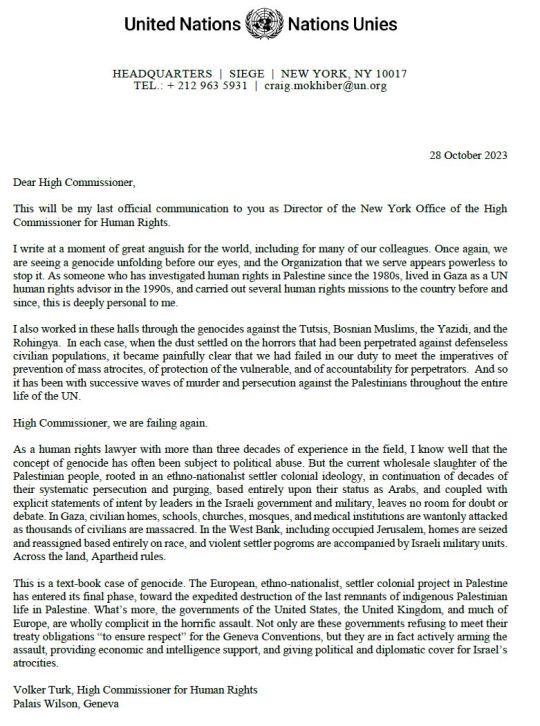
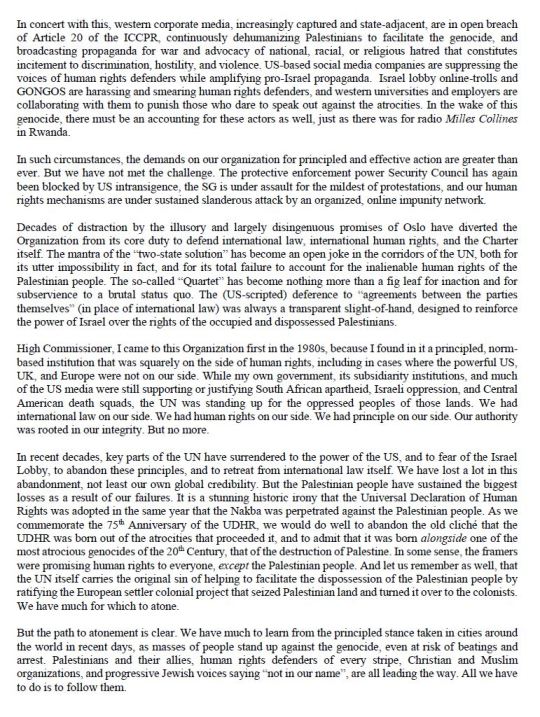
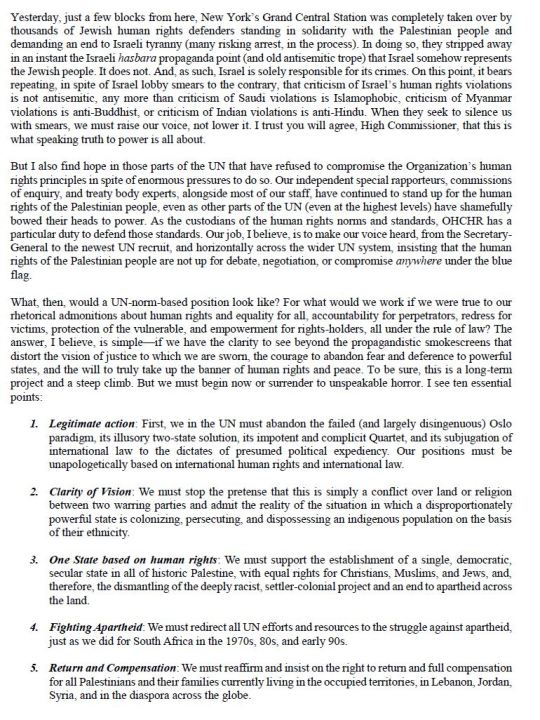
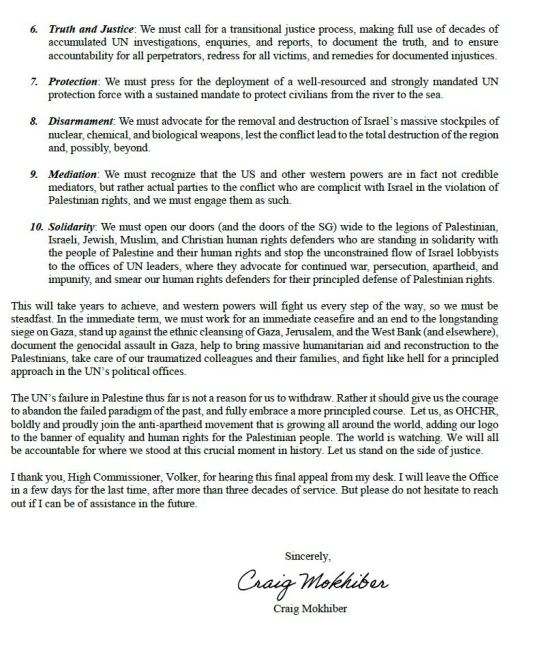
Transcription:
United Nations | Nations Unies
HEADQUARTERS I SIEGE I NEW YORK, NY 10017
28 October 2023
Dear High Commissioner,
This will be my last official communication to you as Director of the New York Office of the High Commissioner for Human Rights.
I write at a moment of great anguish for the world, including for many of our colleagues. Once again, we are seeing a genocide unfolding before our eyes, and the Organization that we serve appears powerless to stop it. As someone who has investigated human rights in Palestine since the 1980s, lived in Gaza as a UN human rights advisor in the 1990s, and carried out several human rights missions to the country before and since, this is deeply personal to me.
I also worked in these halls through the genocides against the Tutsis, Bosnian Muslims, the Yazidi, and the Rohingya. In each case, when the dust settled on the horrors that had been perpetrated against defenseless civilian populations, it became painfully clear that we had failed in our duty to meet the imperatives of prevention of mass atrocites, of protection of the vulnerable, and of accountability for perpetrators. And so it has been with successive waves of murder and persecution against the Palestinians throughout the entire life of the UN.
High Commissioner, we are failing again.
As a human rights lawyer with more than three decades of experience in the field, I know well that the concept of genocide has often been subject to political abuse. But the current wholesale slaughter of the Palestinian people, rooted in an ethno-nationalist settler colonial ideology, in continuation of decades of their systematic persecution and purging, based entirely upon their status as Arabs, and coupled with explicit statements of intent by leaders in the Israeli government and military, leaves no room for doubt or debate. In Gaza, civilian homes, schools, churches, mosques, and medical institutions are wantonly attacked as thousands of civilians are massacred. In the West Bank, including occupied Jerusalem, homes are seized and reassigned based entirely on race, and violent settler pogroms are accompanied by Israeli military units. Across the land, Apartheid rules.
This is a text-book case of genocide. The European, ethno-nationalist, settler colonial project in Palestine has entered its final phase, toward the expedited destruction of the last remnants of indigenous Palestinian life in Palestine. What's more, the governments of the United States, the United Kingdom, and much of Europe, are wholly complicit in the horrific assault. Not only are these governments refusing to meet their treaty obligations "to ensure respect" for the Geneva Conventions, but they are in fact actively arming the assault, providing economic and intelligence support, and giving political and diplomatic cover for Israel's atrocities.
Volker Turk, High Commissioner for Human Rights Palais Wilson, Geneva
In concert with this, western corporate media, increasingly captured and state-adjacent, are in open breach of Article 20 of the ICCPR, continuously dehumanizing Palestinians to facilitate the genocide, and broadcasting propaganda for war and advocacy of national, racial, or religious hatred that constitutes incitement to discrimination, hostility, and violence. US-based social media companies are suppressing the voices of human rights defenders while amplifying pro-Israel propaganda. Israel lobby online-trolls and GONGOS are harassing and smearing human rights defenders, and western universities and employers are collaborating with them to punish those who dare to speak out against the atrocities. In the wake of this genocide, there must be an accounting for these actors as well, just as there was for radio Mules Collins in Rwanda.
In such circumstances, the demands on our organization for principled and effective action are greater than ever. But we phave not met the challenge. The protective enforcement power Security Council has again been blocked by US intransigence, the SG [UN Secretary General] is under assault for the mildest of protestations, and our human rights mechanisms are under sustained slanderous attack by an organized, online impunity network.
Decades of distraction by the illusory and largely disingenuous promises of Oslo have diverted the Organization from its core duty to defend international law, international human rights, and the Charter itself. The mantra of the "two-state solution" has become an open joke in the corridors of the UN, both for its utter impossibility in fact, and for its total failure to account for the inalienable human rights of the Palestinian people. The so-called "Quartet" has become nothing more than a fig leaf for inaction and for subservience to a brutal status quo. The (US-scripted) deference to "agreements between the parties themselves" (in place of international law) was always a transparent slight-of-hand, designed to reinforce the power of Israel over the rights of the occupied and dispossessed Palestinians.
High Commissioner, I came to this Organization first in the 1980s, because I found in it a principled, norm-based institution that was squarely on the side of human rights, including in cases where the powerful US, UK, and Europe were not on our side. While my own government, its subsidiarity institutions, and much of the US media were still supporting or justifying South African apartheid, Israeli oppression, and Central American death squads, the UN was standing up for the oppressed peoples of those lands. We had international law on our side. We had human rights on our side. We had principle on our side. Our authority was rooted in our integrity. But no more.
In recent decades, key parts of the UN have surrendered to the power of the US, and to fear of the Israel Lobby, to abandon these principles, and to retreat from international law itself. We have lost a lot in this abandonment, not least our own global credibility. But the Palestinian people have sustained the biggest losses as a result of our failures. It is a stunning historic irony that the Universal Declaration of Human Rights was adopted in the same year that the Nakba was perpetrated against the Palestinian people. As we commemorate the 75th Anniversary of the UDHR, we would do well to abandon the old cliché that the UDHR was born out of the atrocities that proceeded it, and to admit that it was born alongside one of the most atrocious genocides of the 20th Century, that of the destruction of Palestine. In some sense, the framers were promising human rights to everyone, except the Palestinian people. And let us remember as well, that the UN itself carries the original sin of helping to facilitate the dispossession of the Palestinian people by ratifying the European settler colonial project that seized Palestinian land and turned it over to the colonists. We have much for which to atone.
But the path to atonement is clear. We have much to learn from the principled stance taken in cities around the world in recent days, as masses of people stand up against the genocide, even at risk of beatings and arrest. Palestinians and their allies, human rights defenders of every stripe, Christian and Muslim organizations, and progressive Jewish voices saying "not in our name", are all leading the way. All we have to do is to follow them.
Yesterday, just a few blocks from here, New York's Grand Central Station was completely taken over by thousands of Jewish human rights defenders standing in solidarity with the Palestinian people and demanding an end to Israeli tyranny (many risking arrest, in the process). In doing so, they stripped away in an instant the Israeli hasbara propaganda point (and old antisemitic trope) that Israel somehow represents the Jewish people. It does not. And, as such, Israel is solely responsible for its crimes. On this point, it bears repeating, in spite of Israel lobby smears to the contrary, that criticism of Israel's human rights violations is not antisemitic, any more than criticism of Saudi violations is Islamophobic, criticism of Myanmar violations is anti-Buddhist, or criticism of Indian violations is anti-Hindu. When they seek to silence us with smears, we must raise our voice, not lower it. I trust you will agree, High Commissioner, that this is what speaking truth to power is all about.
But I also find hope in those parts of the UN that have refused to compromise the Organization's human rights principles in spite of enormous pressures to do so. Our independent special rapporteurs, commissions of enquiry, and treaty body experts, alongside most of our staff, have continued to stand up for the human rights of the Palestinian people, even as other parts of the UN (even at the highest levels) have shamefully bowed their heads to power. As the custodians of the human rights norms and standards, OHCHR. has a particular duty to defend those standards. Our job, I believe, is to make our voice heard, from the Secretary-General to the newest UN recruit, and horizontally across the wider UN system, incisting that the human rights of the Palestinian people are not up for debate, negotiation, or compromise anywhere under the blue flag.
What, then, would a UN-norm-based position look like? For what would we work if we were true to our rhetorical admonitions about human rights and equality for all, accountability for perpetrators, redress for victims, protection of the vulnerable, and empowerment for rights-holders, all under the rule of law? The answer, I believe, is simple—if we have the clarity to see beyond the propagandistic smokescreens that distort the vision of justice to which we are sworn, the courage to abandon fear and deference to powerful states, and the will to truly take up the banner of human rights and peace. To be sure, this is a long-term project and a steep climb. But we must begin now or surrender to unspeakable horror. I see ten essential points:
Legitimate action: First, we in the UN must abandon the failed (and largely disingenuous) Oslo paradigm, its illusory two-state solution, its impotent and complicit Quartet, and its subjugation of international law to the dictates of presumed political expediency. Our positions must be unapologetically based on international human rights and international law.
Clarity of Vision: We must stop the pretense that this is simply a conflict over land or religion between two warring parties and admit the reality of the situation in which a disproportionately powerful state is colonizing, persecuting, and dispossessing an indigenous population on the basis of their ethnicity.
One State based on human rights: We must support the establishment of a single, democratic, secular state in all of historic Palestine, with equal rights for Christians, Muslims, and Jews, and, therefore, the dicmantling of the deeply racist, settler-colonial project and an end to apartheid across the land.
Fighting Apartheid: We must redirect all UN efforts and resources to the struggle against apartheid, just as we did for South Africa in the 1970s, 80s, and early 90s.
Return and Compensation: We must reaffirm and insist on the right to return and full compensation for all Palestinians and their families currently living in the occupied territories, in Lebanon, Jordan, Syria, and in the diaspora across the globe.
Truth and Justice: We must call for a transitional justice process, making full use of decades of accumulated UN investigations, enquiries, and reports, to document the truth, and to ensure accountability for all perpetrators, redress for all victims, and remedies for documented injustices.
Protection: We must press for the deployment of a well-resourced and strongly mandated UN protection force with a sustained mandate to protect civilians from the river to the sea.
Disarmament: We must advocate for the removal and destruction of Israel's massive stockpiles of nuclear, chemical, and biological weapons, lest the conflict lead to the total destruction of the region and, possibly, beyond.
Mediation: We must recognize that the US and other western powers are in fact not credible mediators, but rather actual parties to the conflict who are complicit with Israel in the violation of Palestinian rights, and we must engage them as such.
Solidarity: We must open our doors (and the doors of the SG) wide to the legions of Palestinian, Israeli, Jewish, Muslim, and Christian human rights defenders who are standing in solidarity with the people of Palestine and their human rights and stop the unconstrained flow of Israel lobbyists to the offices of UN leaders, where they advocate for continued war, persecution, apartheid, and impunity, and smear our human rights defenders for their principled defense of Palestinian rights.
This will take years to achieve, and western powers will fight us every step of the way, so we must be steadfast. In the immediate term, we must work for an immediate ceasefire and an end to the longstanding siege on Gaza, stand up against the ethnic cleansing of Gaza, Jerusalem, and the West Bank (and elsewhere), document the genocidal assault in Gaza, help to bring massive humanitarian aid and reconstruction to the Palestinians, take care of our traumatized colleagues and their families, and fight like hell for a principled approach in the UN's political offices.
The UN's failure in Palestine thus far is not a reason for us to withdraw. Rather it should give us the courage to abandon the failed paradigm of the past, and fully embrace a more principled course. Let us, as OHCHR, boldly and proudly join the anti-apartheid movement that is growing all around the world, adding our logo to the banner of equality and human rights for the Palestinian people. The world is watching. We will all be accountable for where we stood at this crucial moment in history. Let us stand on the side of justice.
I thank you, High Commissioner, Volker, for hearing this final appeal from my desk. I will leave the Office in a few days for the last time, after more than three decades of service. But please do not hesitate to reach out if I can be of assistance in the future.
Sincerely,
Craig Mokhiber
End of transcription.
Emphasis (bolding) is my own. I have added links, where relevant, to explanations of concepts the former Director refers to.
#Israel#Palestine#October 2023#28 October 2023#United Nations#Described#Long post#I’ll add more links to the things he is talking about later
15K notes
·
View notes
Text


Head Office : 2nd Floor, N Block, Opposite - Axis Bank,
Sector -18, Noida - 201301




#Ready to shape the future? 🌟 Unleash your potential by studying Embedded Engineering in Germany! 🚀🇩🇪 Dive into a world of cutting-edge tech#where you'll gain hands-on experience and top-notch education. From smart devices to automation#immerse yourself in a curriculum designed to fuel your innovation. 🛠️💡#Germany's renowned engineering heritage becomes your classroom as you collaborate with experts and work on real-world projects. 🌐👩🔬 Whethe#IoT#or automotive systems#the possibilities are limitless. Embrace a multicultural environment that nurtures your growth and widens your horizons. 🌍👨🎓 Join the rank#StudyEmbeddedEngineering#GermanyEducation#InnovationHub#https://www.anigdha.com/embedded-engineering-in-germany/#Head Office : 2nd Floor#N Block#Opposite - Axis Bank#Sector -18#Noida - 201301#☎️ 𝐂𝐚𝐥𝐥 𝐔𝐬 𝐍𝐨𝐰: +91- 9810965301#🌐 𝐖𝐞𝐛𝐬𝐢𝐭𝐞: https://www.anigdha.com#📩 𝐄𝐦𝐚𝐢𝐥: [email protected]
0 notes
Text
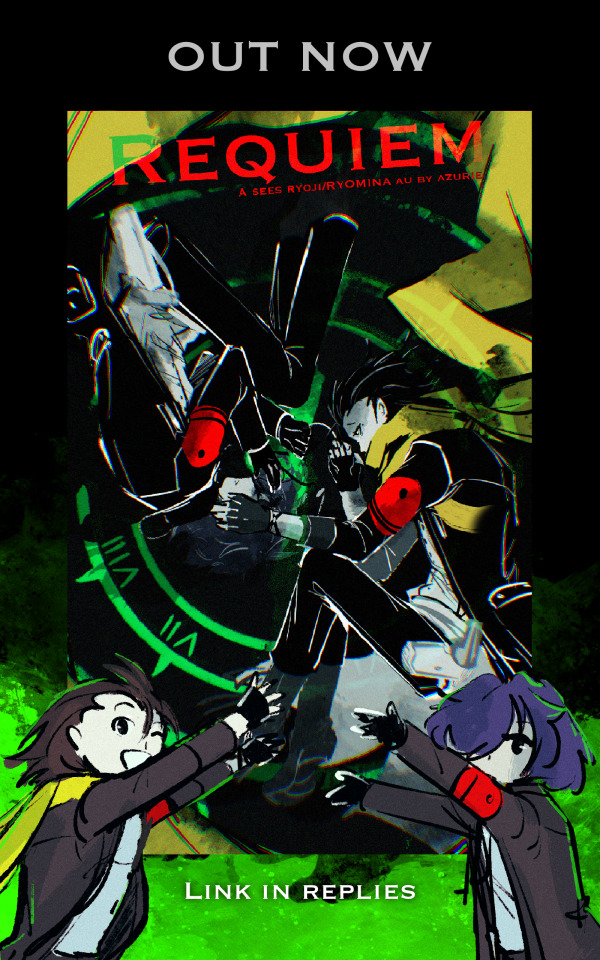
🕰️REQUIEM: A SEES!Ryoji/Ryomina AU IS OUT🕰️
While REQUIEM is 100% free, you are given an option to donate any amount if you are able! Any amount is highly appreciated!
This is the biggest project I’ve done in any fandom I’ve been in but this couldn’t have been possible without your support! I hope you all enjoy 🥹
Details under readmore!
FT: 🌙 A chronological journey worth 15k+ words of interaction and story between Ryoji, The Protag & SEES 🌙 18+ NEW Illustrations & art 🌙 New level info, Ryoji social link & dorm events
🌙Formatted like a screenplay with each event/story beat progressing chronologically as you read through 🌙 Includes embedded links that leads to relevant art and comics (I recommend going through them again for the sake of immersion since it’s meant to be in order!)
#piano arts#ryoji mochizuki#persona 3#p3#p3re#makoto yuki#minato arisato#persona 3 reload#ryomina#sees!ryoji au#sees ryoji au#requiem
320 notes
·
View notes
Text
Pick a card: Your Future Aesthetic.Pick an Image
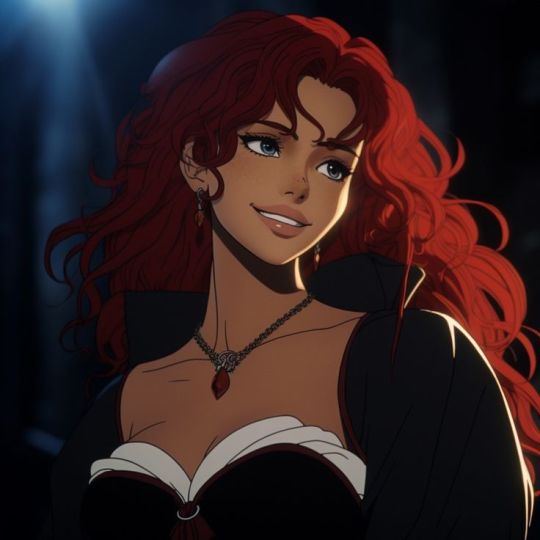
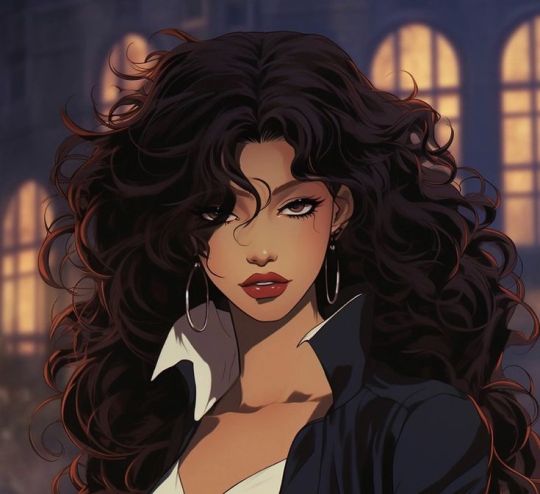
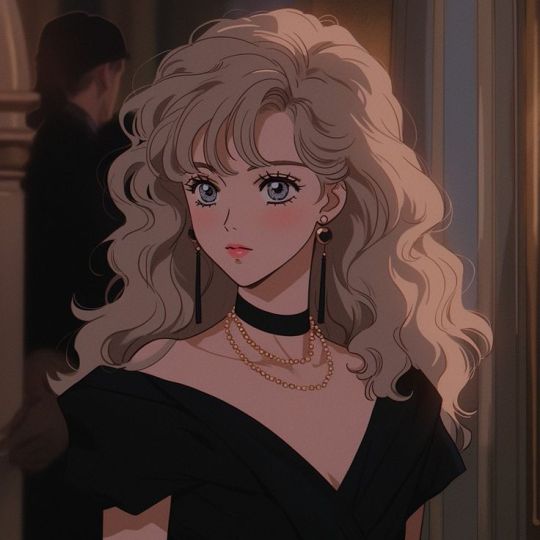
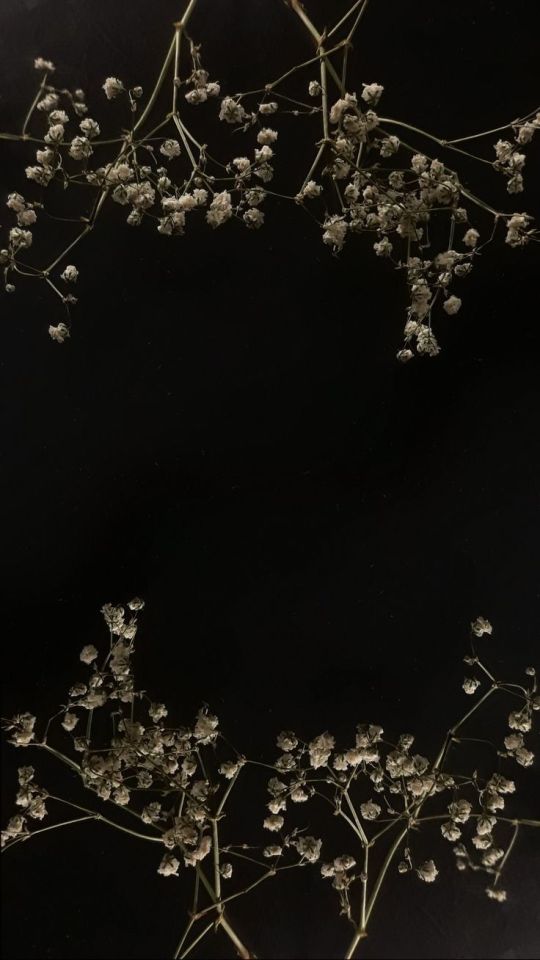
Left to Right Top Row-> Pile 1, Pile 2. Left Bottom Row -> Pile 3 [Pick one of the three]
If You Liked This Reading Sign up to TheObsidianPages777 Newsletter
+Free E-Guides on New Moon Manifestation and Gem Stone for Life Path
Reading 1: The Ethereal Dreamer
Card Drawn: The Star
Your future self will be deeply enchanted by an ethereal, dreamy aesthetic. Imagine a world filled with soft, flowing fabrics in pastel hues like lavender, blush pink, and sky blue. Your spaces will be adorned with fairy lights, delicate crystals, and celestial motifs such as stars and moons. This aesthetic is all about creating a serene, magical atmosphere that feels almost otherworldly.

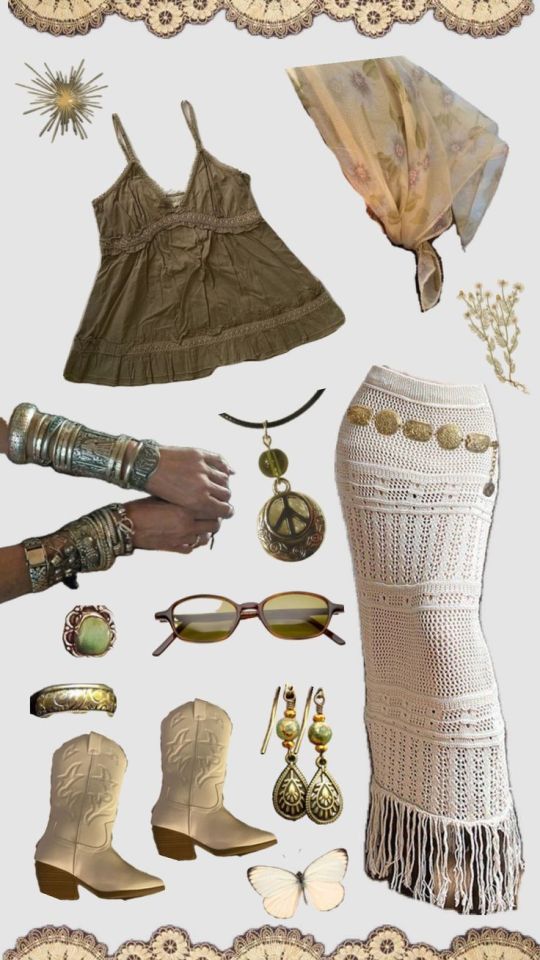
Your fashion choices will lean towards flowing, bohemian dresses, sheer materials, and intricate lace details.Mostly pastel themes. Being attracted to light colors.Butterfly motifs are prominent. You might carry a free flowing nature to your personality representing your aspirations towards expansion of peace.
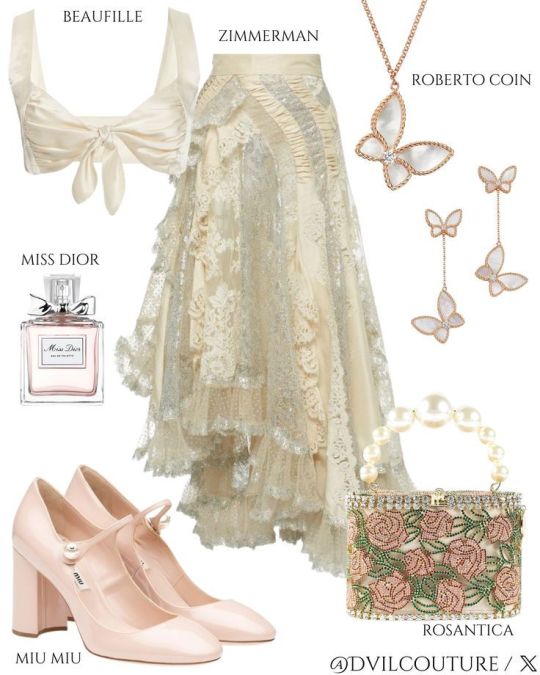
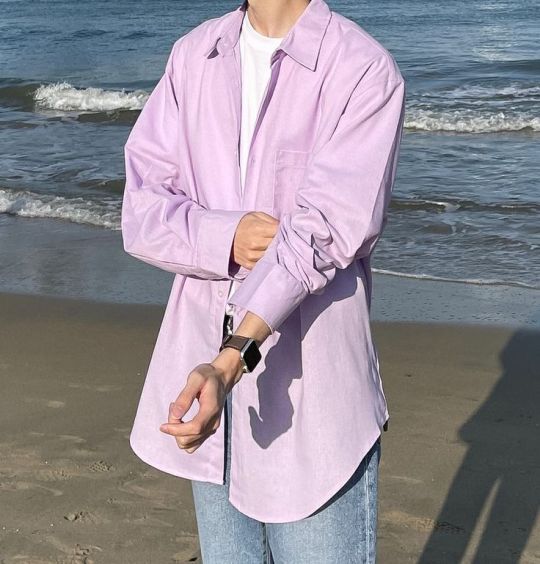
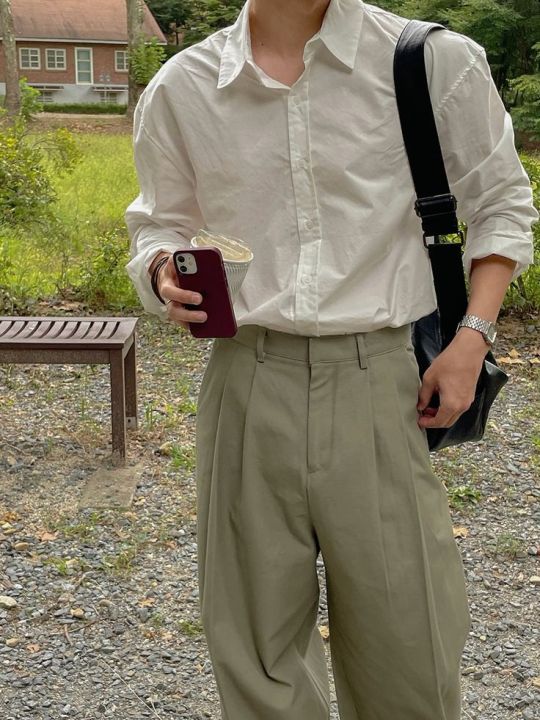

Home decor will feature airy, light-filled spaces with plenty of natural elements like feathers, geodes, and plants.


Your future self will seek to create a sanctuary that feels like a serene escape from reality, full of whimsical fairie-esque and gentle beauty.
================================================================================================
Reading 2: The Bold Visionary
Card Drawn: The Emperor
Your future self will gravitate towards a bold, visionary aesthetic that exudes confidence and sophistication. This look is defined by strong lines, rich colors like deep navy, burgundy, and emerald, and luxurious materials such as velvet, leather, and silk.

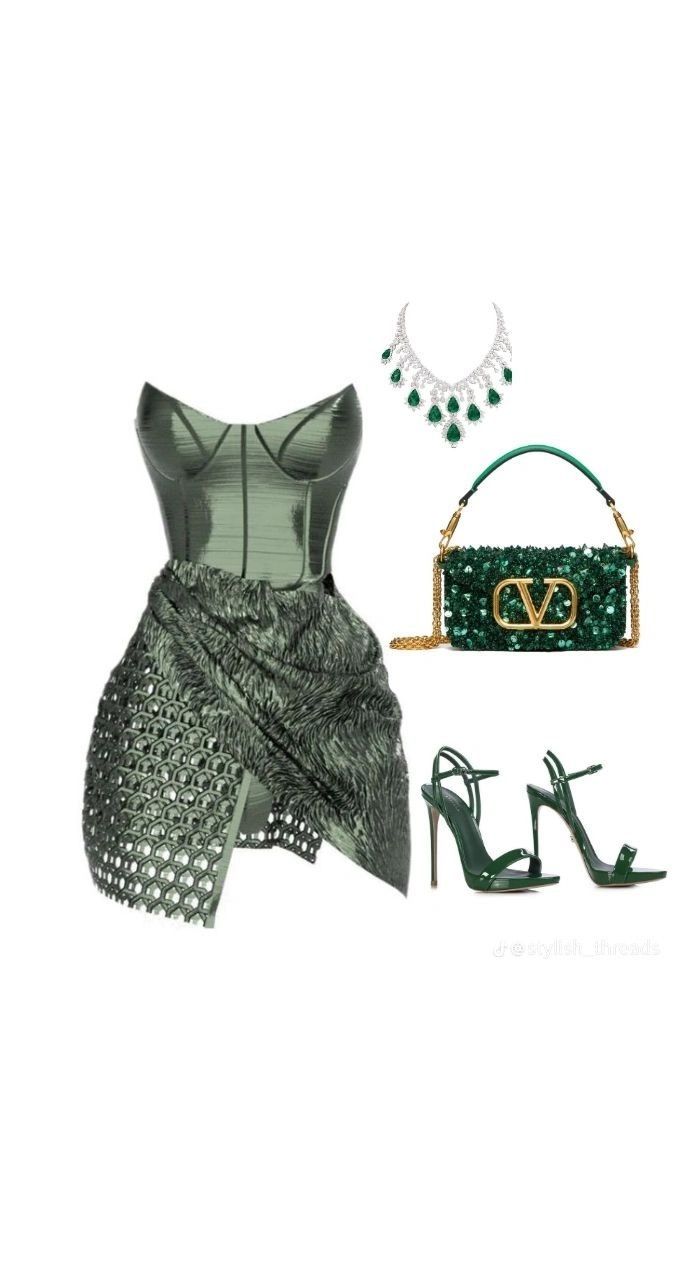
Your fashion will include tailored suits, statement pieces with geometric patterns, and accessories that make a statement.


Home decor will feature modern furniture with clean lines, metallic accents, and striking art pieces. Your spaces will be meticulously organized and designed to project power and elegance.
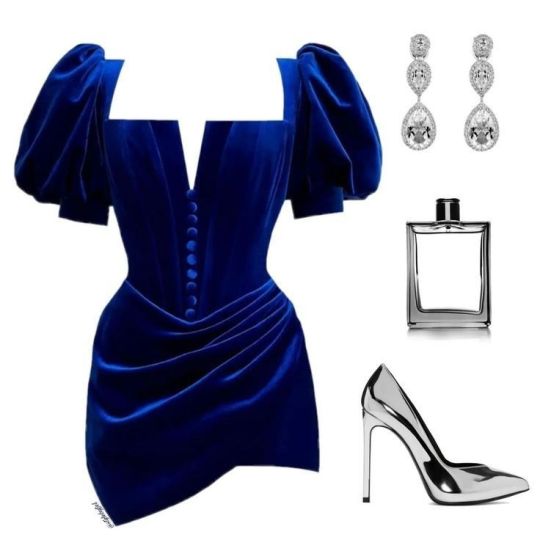
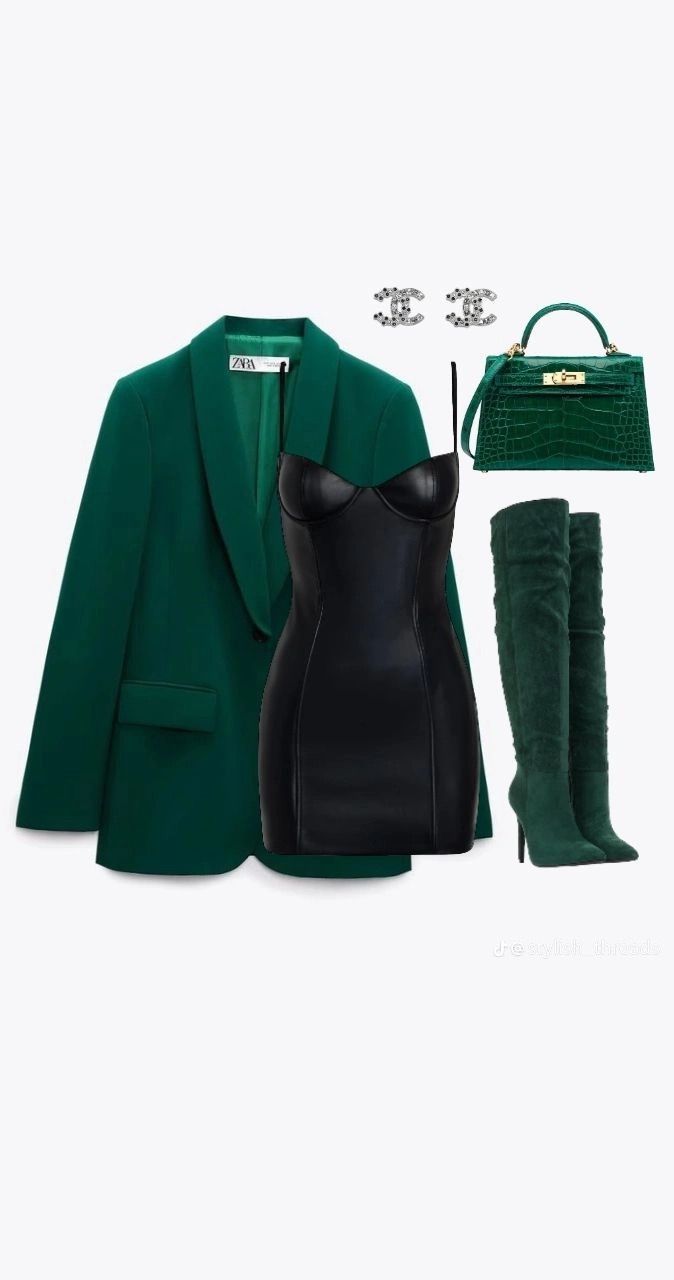
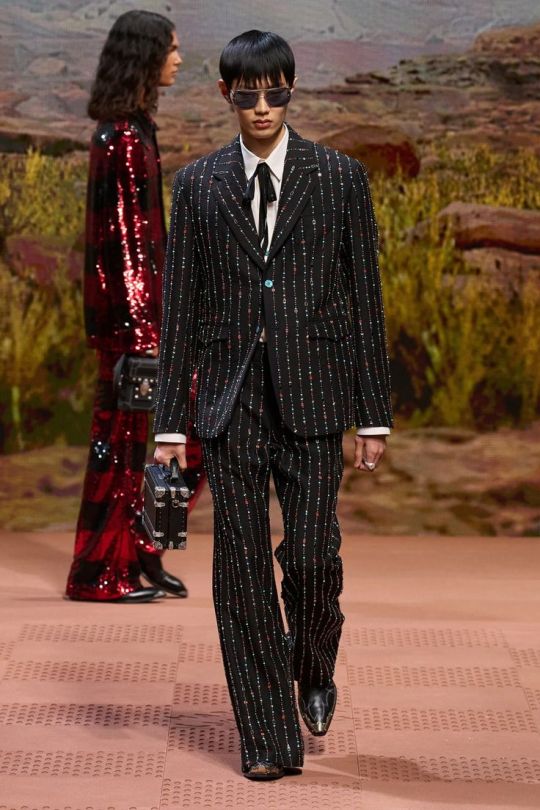
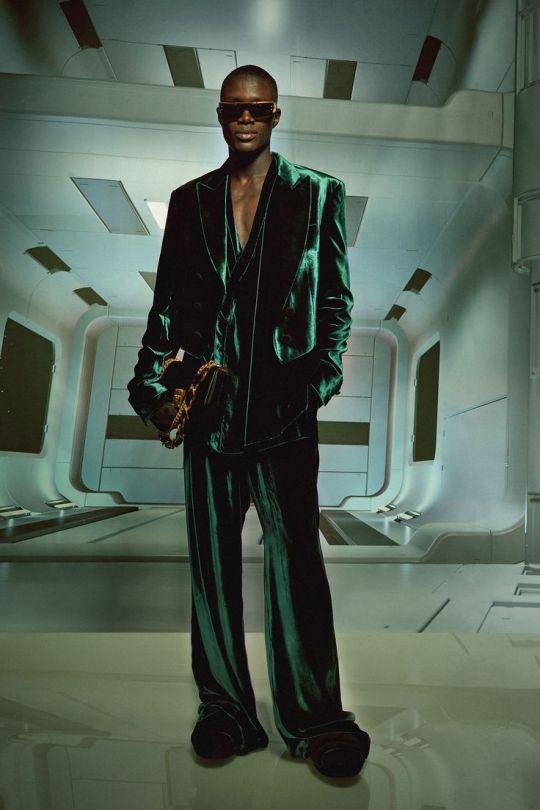
The aesthetic you will love is one that commands attention and reflects a sense of authority and ambition, perfectly suited for a leader who is unafraid to stand out and make bold moves.
================================================================================================
Reading 3: The Vintage Romantic
Card Drawn: The Lovers
Your future self will find joy in a vintage, romantic aesthetic that celebrates nostalgia and timeless beauty.
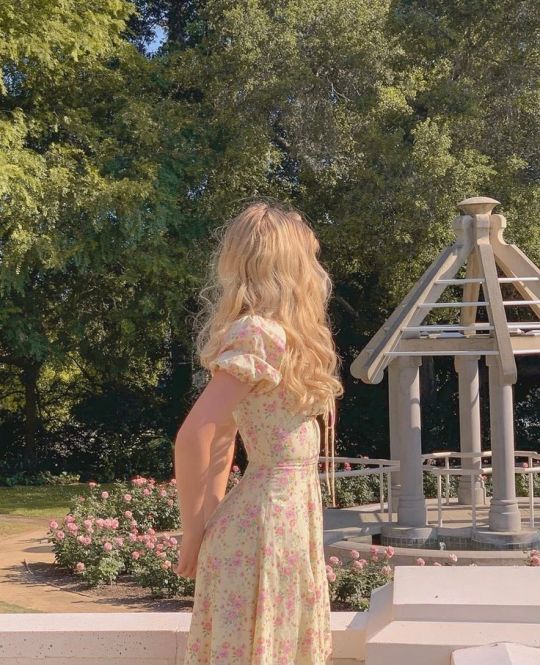
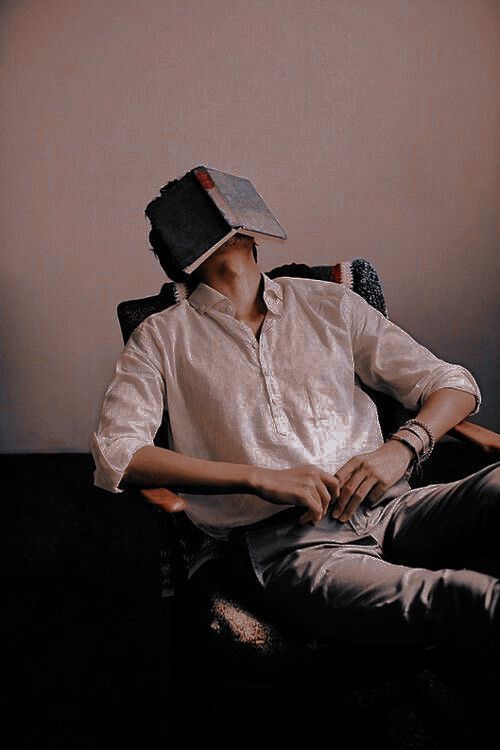
Picture a world filled with delicate floral patterns, antique furniture, and soft, muted tones like rose, cream, and sage green. Your fashion will be inspired by eras past, with a love for lace, vintage dresses, pearl accessories, and retro hairstyles.
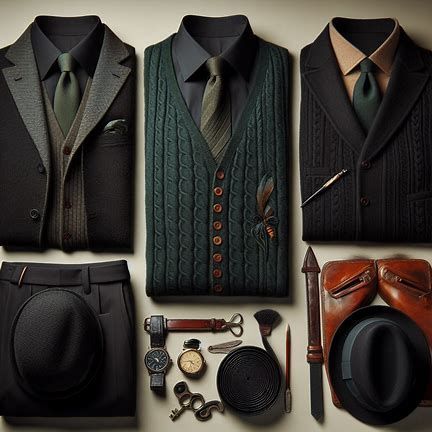

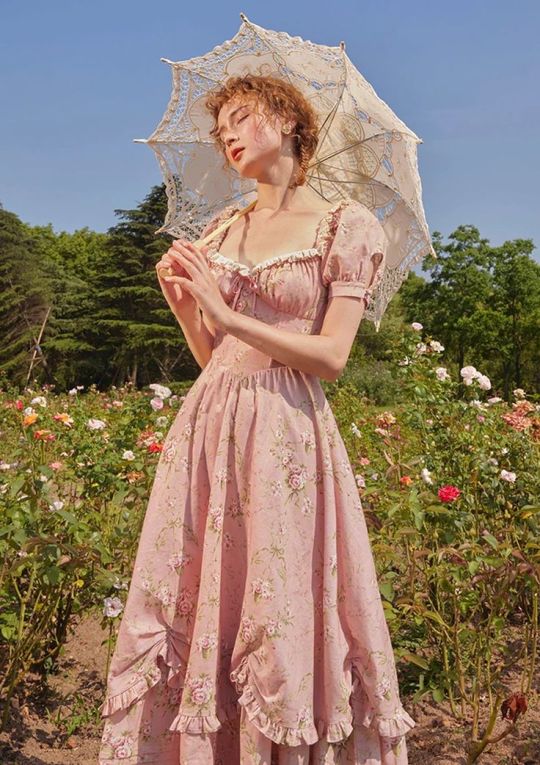
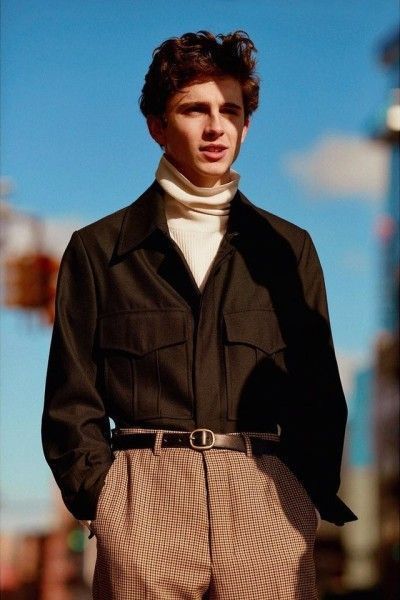
Home decor will feature shabby chic elements, ornate picture frames, and cozy, intimate settings with lots of personal touches like family heirlooms and handmade crafts.
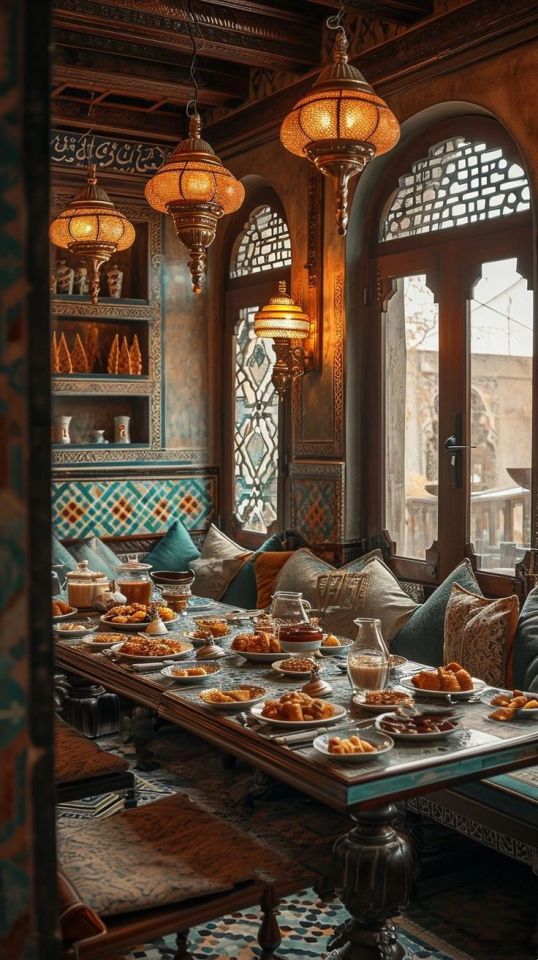

This aesthetic is all about creating a warm, inviting atmosphere that feels both elegant and charmingly old-fashioned. Your future self will delight in the romance and history embedded in this timeless style.
================================================================================================
If You Liked This Reading Sign up to TheObsidianPages777 Newsletter
+Free E-Guides on New Moon Manifestation and Gem Stone for Life Path
#pick a photo#pick a card#pick a picture#pick a pile#tarot cards#psychic readings#aesthetic#cottagecore#royalcore#fairycore#future life#future predictions#tarot reading#pick one#house aesthetic#fashion#your style
531 notes
·
View notes
Note
hello 🙊 for the prompt list thing may i request 17 + 28 with lino or jisung pls 😌 excited to see what you'll come up with heheh
i had fun with this request, anon. it's kind of sad so maybe i'll write a little part 2 to it but ig we all need some angst from time to time. i was actually going to write jisung for this fic but i'll save him for another ><
rose - lee minho
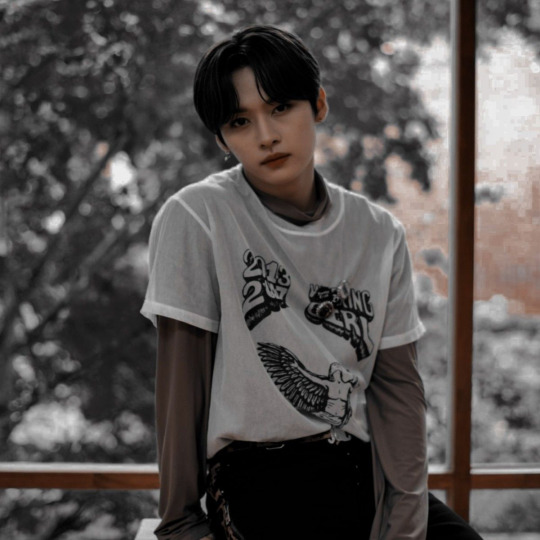

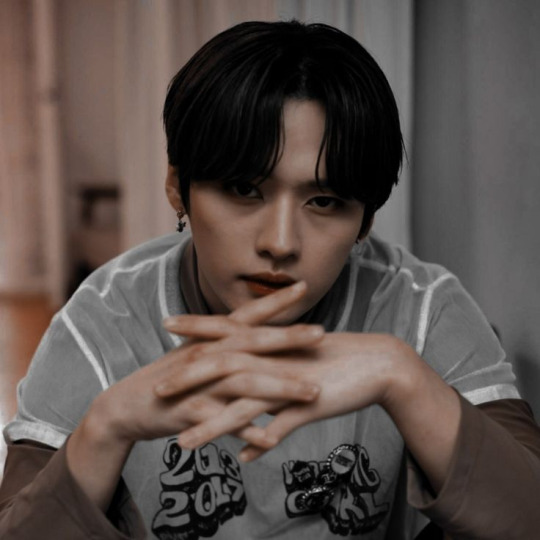

pairing: lee minho x reader
summary: you and lee minho, the smartest student on campus, get unexpectedly paired up to work on an assignment
genre: kinda angsty ngl, escalates quickly, college!au, mutual pining, mentions of being thrown out a window (it's a minho fic what do you expect)
a/n: this isn't really how i saw it going but fuck it we ball. dividers by @kodaswrld
⛓️ prompts: 17. "Why are you looking at me like that?" / 28. "You're looking at me like that again."
skz prompt list | skz masterlist

"It doesn't make sense," you groan, dropping your head into your hands. Giving up completely, you drop yourself further into the mess of books and papers scattered across Minho's low desk.
Today, the sun is watery and filters weakly through the wide windows of Minho's dorm bedroom, making everything seem pale and slightly colder than usual. You rub your feet together under the desk, your fluffy socks providing some comfort, before it evaporates as you turn back to the part of the assignment you've been struggling over for the past hour.
Minho is sitting across from you, embedded in his own section of the assignment; his head is bent and he sits with his back straight, his elbows positioned so that they just touch the edge of the table. He is pale in the weak sunlight and the only movement he makes comes from the slight flicking of his wrist as he neatly scribes down notes, apparently unaware of your predicament.
He looks like a statue, you think.
"Hey, Minnie," you hum lowly, resorting to annoying him instead of re-attempting your part of the assignment. "Help me out."
"No. And don't call me that."
You groan, pressing your fingers down onto the table and pushing several miscellaneous papers his way. A couple of sticky notes go flying too, and Minho sighs irritatedly as he plucks one off of the collar of his pristine white shirt.
Your eyes follow the trail of his hand as he lowers it, before it creeps back up. His top two buttons are undone and you can see the attractive glint of a necklace, a sleek chain perhaps, against the perfect porcelain skin of his throat-
You sigh. Of all people, why him?
You wish you'd been allowed to choose your own partner for the project. But your professor had other ideas in mind and decided to pair up random people 'to facilitate teamwork and spark new connections' or whatever. Something like that.
Much to your disappointment, you'd been separated from your friends and teamed up with Lee Minho. You knew of him but had never actually talked. Unless you counted that one time where you'd run face-first into him as he'd been coming out of the college library. And all that had been was a rushed apology from you and a slight, huffy glare from him.
He was kind of strange, you thought. He always sat at the front of every lecture, always finished his work way before it was due and scored perfectly every time. Without missing a beat and without breaking a sweat. It was so incredibly irritating.
On top of that, he was popular, usually swarmed by friends and other students whenever he walked the halls. Not that he seemed to notice most of the time. Or maybe he just didn't care. Maybe he was a robot. It would explain his behaviour.
A really attractive robot at that.
You crane your neck a little, peering over the stacks of books between the both of you and see that he's almost done writing up his notes for his section. All without even so much as a glance in your direction. Your page isn't even half-full and you're stuck.
"Why'd you ask me to come to your dorm if you were just gonna ignore me?" You whine.
"Because," he says calmly, "it's easier than having to do it over the phone."
Little shit.
"What about the library?" You retort. "We could have just gone there."
Minho doesn't take his eyes off the paper and he doesn't reply either. Faint colour rises in his cheeks but you're too wrapped up in your own current problems to notice.
"Minho, come on. We're supposed to be working together." You tilt your head and fix him with a pleading gaze, half-despair, half panic. You're not dumb, and maybe not incredibly smart like Lee Minho either, but this assignment is difficult. And it's harder when he's refusing to help.
You don't take your eyes off of him, deciding to keep your gaze fixed on his face until he chooses to acknowledge you. You wait almost ten minutes before he looks up again, and he jolts slightly, like he hasn't realised you've been fixated on him all that time.
He stiffens. "Why are you looking at me like that?"
"Because. I need help."
"You're clever. Figure it out on your own."
Your heart flutters from the rather direct compliment but you choose to ignore it. "Minho, please."
He smirks suddenly, a short bout of apparent confidence, teasing as he imitates you. "Minho, please."
You swear and lift a fist but he doesn't even flinch. He looks at you quietly and his smile disappears, then he gets up and crouches down beside you, poring over your page.
He hums. "You didn't write shit."
You groan. "Yes, I know. Thank you for clarifying."
"You're welcome," he murmurs, unfazed, eyes fixed on the page.
It's then that you realise how close he is; he's not sitting down fully, leaning on the balls on his feet, a temporary sitting position. One hand is on the desk and he's leaning in a little, his mouth moving slightly as he exhales out words, skim-reading your page.
He smells good, you think.
Minho is there for what feels like hours but is probably a few seconds, and then he leans back, fixing you with a stare. You feel the unusual warmth of his presence near you fade, like a mug of hot tea gone cold, and a bitter feeling rises in your throat. You open your mouth a little, maybe to prepare for whatever insult he's concocted, but it doesn't come.
What does come is an unexpectedly gentle explanation of your section of the assignment. He moves a little closer to point things out on your research papers, so close that if you turned your head, the tip of your nose would brush his chest. He's looming over you a little but you feel strangely protected, and you find yourself relishing in the almost-contact of Minho being there beside you.
So much so that when he leans back to clarify that you've understood what he's been saying, you find yourself as a loss for words. All you can do is gaze up at his stupidly perfect face, mind whirring with many thoughts but none as present as the fact that you hadn't been listening and now he will probably throw you out the window.
"Y/n."
You blink once, slowly, stupidly.
"You're looking at me like that again."
And maybe it's the fact that this whole thing feels unreal, or that the assignment has you so dazed, or that you're working with Lee Minho of all people, but you suddenly find your hand reaching up to brush a strand of soft hair out of his eyes. It trails down until your thumb rests gently in the middle of his plush bottom lip. You expect him to move back, chide you, glare, push you away.
But he doesn't.
Later, you will be embarrassed by this memory, and the fact dimly registers somewhere in the back of your mind.
It seems to register in Minho's mind too, because his eyes widen a fraction and suddenly you find yourself falling off the soft, ethereal cloud of fantasy into the real world, where consequences and rational thoughts exist, though they didn't several seconds earlier.
You jerk your hand back and he looks almost disappointed, but you don't notice. A strand of fumbled apologies leaves your mouth as you stand, almost tripping, and quickly collect your belongings.
Minho has his hands out, seemingly trying to stop you, but his face is burning and unsure and you brush past him, fleeing as your eyes sting with tears. You rush through the unfamiliar setting of his dorm and eventually find the door.
"Wait," Minho gasps, seemingly out of breath. From what, you don't know. He still has his hands out, but he doesn't move to touch you, maybe afraid that he might scare you or cause some sort of unwanted reaction. Not that you're not already having one.
"Please," he says, quieter. You're still fumbling with the lock on the door, back to him. And you're not listening, too dazed and afraid to turn and face him. Humiliation washes over you in waves.
You feel so embarrassed.
But Minho has yet to throw an insult or a glare. He's just standing there, his hands out, almost reaching, and an expression of near-worry on his face. It looks strange, like he's not quite sure how to move his features to express it. In other situations, you would have laughed. Now all you want to do is cry.
The lock on the dormitory door finally gives and you rush out, disappearing down the hallway in a blur. Minho lets out a last, frantic 'wait' and considers rushing after you, but his rationality tells him it would just make things worse.
He pushes the door shut in a haze and sinks down against it, his hair ruffling against the smooth, white wood. He finds himself out of breath again, like he's been running, though he hasn't, and his stomach feels funny. Like something is leaping around inside it.
It's not unpleasant, almost a nice feeling, but it's unfamiliar and Minho has learnt to recognise that unfamiliar is usually not a good sign. He's supposed to know things and the feeling won't stop, so he puts both hands on his stomach to try and press it out, maybe.
But it doesn't work. Flashes of you run through his mind and the feeling only intensifies. His face feels like it's burning and he is bewildered, rosy in the weak sunlight. And he has a sudden, strange longing, yearning, maybe, to see you again.
Is it because you touched his face like that and he kind of liked it, maybe? Is it because he enjoyed having you around even though you're not a friend, or is it because you're a familiar face at college, and familiar is good and familiar is safe? He doesn't know.
A rather raw feeling surfaces in his chest and he almost gags at the unexpectedness of it. Suddenly he's on a stormy ocean, waves ravaging and lightning flashing all around him. He falls off his boat and loses his grip on the anchor and sinks into the cold, dark sea.
It runs down his cheeks, staining them wet and salty. And he's not one to be overemotional or show much of it in the first place unless there is a real reason, but he can't stop.
Minho puts his head in his hands and cries.

a/n: part 2?
#skz scenarios#skz#stray kids fanfic#leeknow#minho#stray kids minho#starlost mochi#stray kids fluff#skz fics#stray kids fanfiction#starlost mochi fics#stray kids#skz imagines#skz fluff#felix#leeknow x reader#skz angst#leeknow angst#minho x reader#minho fanfiction#leeknow fic#lee minho stray kids#lee minho skz#lee minho x you#lee know imagines#lee know stray kids#lee know x reader#skz x reader
153 notes
·
View notes
Text
PROTOCOL Pairing: Doctor Zayne x Nurse Reader
author note: love and deepspace is my addiction guys LOL anyways enjoy!!
wc: 3,865
✦•┈๑⋅⋯ ⋯⋅๑┈•✦
Akso Hospital looms in the heart of Linkon like a monument of glass, metal, and unrelenting precision. Multi-tiered, climate-controlled, and fully integrated with city-wide telemetry systems, it's known across the cosmos for housing the most advanced medical AI and the most exacting surgeons in the Union.
Inside its Observation Deck on Level 4, the air hums with quiet purpose. Disinfectant and filtered oxygen mix in sterile harmony. The floors are polished to a mirrored sheen, the walls pulse faintly with embedded biometrics, and translucent holoscreens scroll real-time vitals, arterial scans, and surgical priority tags in muted color-coded displays.
You’ve been on the floor since 0500. First to check vitals. First to inventory meds. First to get snapped at.
Doctor Zayne Li is already here—of course he is. The man practically lives in the operating theatres. Standing behind the panoramic glass that overlooks Surgery Bay Delta, he looks like something carved out of discipline and frost. His pristine long coat hangs perfectly from squared shoulders, gloves tucked with methodical precision, silver-framed glasses reflecting faint readouts from the transparent interface hovering before him.
He’s the hospital’s prized cardiovascular surgeon. The Zayne Li—graduated top of his class from Astral Medica, youngest surgeon ever certified for off-planet cardiac reconstruction, published more than any other specialist in the central systems under 35. There's even a rumor he once performed a dual-heart transplant in an emergency gravity failure. Probably true.
He’s a legend. A genius.
And an ass.
He’s never once smiled at you. Never once said thank you. With other staff, he’s distant but civil. With you, he’s something else entirely: cold, strict, and unrelentingly sharp. If you breathe wrong, he notices. If you hesitate, he corrects. If you do everything by protocol?
He still finds something to critique.
"Vitals on Bed 12 were late," he said this morning without even turning his head. No greeting. Just judgment, clean and surgical.
"They weren’t late. I had to reset the cuff."
"You should anticipate equipment failures. That’s part of the job."
And that was it. No acknowledgment of the three critical patients you’d managed in that hour. No recognition. No room for explanation. He turned away before you could blink, his coat slicing behind him like punctuation.
You don’t like him.
You don’t disrespect him—because you're a professional, and because he's earned his reputation a hundred times over. But you don’t like how he talks to you like you’re a glitch in the system. Like you’re a deviation he hasn’t figured out how to reprogram.
You’ve worked under strict doctors before. But Zayne is different. He doesn’t push to challenge you. He pushes to see if you’ll break.
And the worst part?
You haven’t.
Which only seems to piss him off more.
You watch him now from the break table near the edge of the deck, your synth-coffee going tepid between your hands. He’s reviewing scans on a projection screen—high-res, rotating 3D models of a degenerating bio-synthetic valve. His eyes, a pale hazel-green, flick across the data with sharp focus. His arms are folded behind his back, posture perfect, expression unreadable.
He hasn’t noticed you.
Correction: he has, and he’s pointedly ignoring you.
Typical.
You take another sip of coffee, more bitter than before. You could head back to inventory. You could restock surgical trays. But you don’t.
Because part of you refuses to give him the satisfaction of leaving first.
So you stay.
And so does he.
Two professionals. Two adversaries. One cold war fought in clipped words, clinical tension, and overlapping silence.
And the day hasn’t even started yet.
The surgical light beams down like a second sun, flooding the operating theatre in harsh, clinical brightness. It washes the color out of everything—blood, skin, even breath—until all that remains is precision.
Doctor Zayne Li stands at the head of the table, gloved hands elevated and scrubbed raw, sleeves of his sterile gown clinging tight around his forearms. His eyes flick up to the vitals screen, then down to the patient’s exposed chest.
“Vitals?” he asks.
You answer without hesitation. “Steady. HR 82, BP 96/63, oxygen at 99%, no irregularities.”
His silence is your only cue to proceed.
You hand him the scalpel, handle first, exactly as protocol demands. He doesn’t look at you when he takes it—but his fingers graze yours, cold through double-layered gloves, and the contact still sends a tiny jolt up your arm. Annoying.
He makes the incision without fanfare, clean and deliberate, the kind of cut that only comes from years of obsessive mastery. The kind that still makes your gut tighten to watch.
You monitor the instruments, anticipating without crowding him. You’ve been assisting in his surgeries for weeks now. You’ve learned when he prefers the microclamp versus the stabilizer. You’ve memorized the sequence of his suturing pattern. You know when to speak and when not to. Still, it’s never enough.
“Retractor,” he says flatly.
You’re already reaching.
“Not that one.”
Your hand freezes mid-motion.
His tone is ice. “Cardiac thoracic, not abdominal. Are you even awake?”
A hot flush rises behind your ears. He doesn’t yell—Zayne never yells—but his disappointment cuts deeper than a scalpel. You grit your teeth and correct the tray.
“Cardiac thoracic,” you repeat. “Understood.”
No response. Just the soft click of metal as he inserts the retractor into the sternotomy.
The rest of the operation is silence and beeping. You suction blood before he asks. He cauterizes without hesitation. The damaged aortic valve is removed, replaced with a synthetic graft designed for lunar-pressure tolerance. It’s delicate work—millimeter adjustments, microscopic thread. One wrong move could tear the tissue.
Zayne doesn’t shake. Doesn’t blink. He’s terrifyingly still, even as alarms spike and the patient's BP dips for three agonizing seconds.
“Clamp. Now,” he says.
You pass it instantly. He seals the nicked vessel, stabilizes the pressure, and the monitor quiets.
You exhale—but not too loudly. Not until the final suture is tied, the chest closed, and the drape removed. Then, and only then, does he speak again.
“Clean,” he says, already walking away. “Prepare a report for Post-Op within the hour.”
You stare at his retreating back, fists clenched at your sides. No thank you. No good work. Just a cold command and disappearing footsteps.
The Diagnostic Lab is silent, save for the low hum of scanners and the occasional pulse of a vitascan completing a loop. The walls are steel-paneled with matte black inlays, lit only by the soft glow of holographic interfaces. Ambient light drifts in from a side wall of glass, showing the icy curve of Europa in the distance, half-shadowed in space.
You stand alone at a curved diagnostics console, sleeves rolled just above your elbows, eyes locked on the 3D hologram spinning in front of you. The synthetic heart pulses slowly, arteries reconstructed with precise synthetic grafts. The valve—a platinum-carbon composite—is functioning perfectly. You check the scan tags, patient ID, op codes, and log the post-op outcome.
Everything’s clean. Correct.
Or so you thought.
You barely register the soft hiss of the door opening behind you until the room shifts. Not in volume, but in pressure—like gravity suddenly increased by one degree.
You don’t turn. You don’t have to.
Zayne.
“Line 12 in the file log,” he says, voice low, composed, and close. Too close.
You blink at the screen. “What about it?”
“You mislabeled the scan entry. That’s a formatting violation.”
Your heart rate ticks up. You straighten your spine.
“No,” you reply calmly, “I used trauma tags from pre-op logs. They cross-reference with the emergency surgical queue.”
His footsteps approach—measured, deliberate—and stop directly behind you. You sense the heat of his body before anything else. He’s not touching you, but he’s close enough that you feel him standing there, like a charged wire humming at your back.
“You adapted a tag system that’s not recognized by this wing’s software. If these were pushed to central review, they’d get flagged. Wasting time.” His tone is even. Too even.
Your hands rest on the edge of the console. You force your shoulders not to tense.
“I made a call based on the context. It was logical.”
“You’re not here to improvise logic,” he replies, stepping even closer.
You feel the air change as he raises his arm, reaching past you—his coat sleeve brushing the side of your bicep lightly, the barest whisper of contact. His hand moves with surgical confidence as he taps the air beside your own, opening the tag metadata on the scan you just logged. His fingers are long, gloved, deliberate in motion.
“This,” he says, highlighting a code block, “should have been labeled with an ICU procedural tag, not pre-op trauma shorthand.”
You turn your head slightly, and there he is. Close. Towering. His jaw is tight, clean-shaven except for the faintest trace of stubble catching the edge of the light. There’s a tiredness around his eyes—subtle, buried deep—but he doesn’t blink. Doesn’t waver. He’s so still it’s unnerving.
He doesn’t seem to notice—or care—how near he is.
You, however, are all too aware.
Your voice tightens. “Is there a reason you couldn’t point this out without standing over me like I’m in your way?”
Zayne doesn’t flinch. “If I stood ten feet back, you’d still argue with me.”
You bristle. “Because I know what I’m doing.”
“And yet,” he replies coolly, “I’m the one correcting your data.”
That sting digs deep. You pull in a breath, clenching your fists subtly against the side of the console. You want to yell. But you won’t. Because he wants control, and you won’t give him that too.
He lowers his hand slowly, retracting from the display, and finally—finally—steps back. Just enough to let you breathe again.
But the tension? It lingers like static.
“I’ll correct the tag,” you say flatly.
Zayne nods once, then turns to go.
But at the doorway, he stops.
Without looking back, he adds, “You're capable. That’s why I expect better.”
Then he walks out.
Leaving you in the cold hum of the diagnostic lab, your pulse racing, your thoughts a snarl of frustration and something else—unsettling and electric—curling low in your gut.
You don’t know what that something is.
But you’re starting to suspect it won’t go away quietly.
You sit three seats from the end of the long chrome conference table, back straight, shoulders tight, fingers wrapped just a little too hard around your datapad.
The Surgical Briefing Room is too bright. It always is. Cold light from the ceiling plates bounces off polished surfaces, glass walls, and the brushed steel of the central console. A hologram hovers in the center of the room, slowly spinning: the reconstructed heart from this morning’s procedure, arteries lit in pulsing red and cyan.
You can feel sweat prickling at the nape of your neck under your uniform collar. Your scrubs are crisp, your hair pinned back precisely, your notes immaculate—but none of that matters when Dr. Myles Hanron speaks.
You’ve only spoken to him a few times. He’s been at Bell for twenty years. Stern. Respected. Impossible to argue with. Today, he's reviewing the recent cardiovascular procedure—the one you assisted under Zayne’s lead.
And something is off. He’s frowning at the scan display.
Then he looks at you.
“Explain this inconsistency in the anticoagulation log.”
You glance up, already feeling the slow roll of nausea in your stomach.
Your voice comes out measured, but your throat is dry. “I followed the automated-calibrated dosage curve based on intra-op vitals and confirmed with the automated log.”
Hanron raises a brow, his tablet casting a soft reflection on the lenses of his glasses. “Then you followed it wrong.”
The words hit like a slap across your face.
You feel the blood drain from your cheeks. Something sharp twists in your stomach.
“I—” you begin, mouth parting. You shift slightly in your seat, fingers tightening on the datapad in your lap, legs crossed too stiffly. Your body wants to shrink, but you force yourself not to move.
“Don’t interrupt,” Hanron snaps, before you can finish.
A few heads turn in your direction. One of the interns frowns, glancing at you with wide eyes. You stare straight ahead, trying to keep your breathing even, your spine straight, your jaw from visibly clenching.
Hanron paces two steps in front of the display. “You logged a 0.3 ml deviation on a patient with a known history of arrhythmic episodes. Are you unfamiliar with the case history? Or did you just not check?”
“I did check,” you say, quieter, trying to keep your tone professional. Your hands are starting to sweat. “The scan flagged it within range. I wasn’t improvising—”
“Then how did this discrepancy occur?” he presses. “Or are you suggesting the system is at fault?”
You flinch, slightly. You open your mouth to say something—to explain the terminal sync issue you noticed during the last vitals run—but your voice catches.
You’re a nurse.
You’re new.
So you sit there, every instinct in your body screaming to speak, to defend yourself—but you swallow it down.
You stare down at your datapad, the screen now blurred from the way your vision’s tunneling. You clench your teeth until your jaw aches.
You can’t speak up. Not without making it worse.
“Let this be a reminder,” Hanron says, turning his back to you as he scrolls through another projection, “that there is no room for guesswork in surgical prep. Especially not from auxiliary staff who feel the need to act above their training.”
Auxiliary.
The word burns.
You feel heat crawl up your chest. Your hands are shaking slightly. You grip your knees under the table to hide it.
And then—
“I signed off on that dosage.”
Zayne’s voice cuts clean through the air like a cold wire.
You turn your head sharply toward the door. He’s standing in the entrance, posture military-straight, coat half-unbuttoned, gloves tucked into his belt. His presence shifts the atmosphere instantly.
His black hair is perfectly combed back, not a strand out of place, glinting faintly under the sterile overhead lights. His silver-framed glasses sit low on the bridge of his nose, catching a brief reflection from the room’s data panels, but not enough to hide the expression in his eyes.
Hazel-green. Pale and piercing
He’s not looking at you. His gaze is fixed past you, locked on Hanron with unflinching intensity—like the man has just committed a fundamental breach of logic.
There’s not a wrinkle in his coat. Not a single misaligned button or loose thread. Even the gloves at his belt look placed, not shoved there. Zayne is, as always, polished. Meticulous. Icy.
But today—his expression is different.
His jaw is set tighter than usual. The faint crease between his brows is deeper. He looks like a man on the verge of unsheathing a scalpel, not for surgery—but for precision retaliation.
And when he speaks, his voice is calm. Controlled.
His face is unreadable. Voice flat.
“If there’s a problem with it, you can take it up with me.”
The silence in the room is instant. Tense. Airless.
Hanron turns slowly. “Doctor Zayne, this isn’t about—”
“It is,” Zayne replies, tone even sharper. “You’re implying a clinical error in my procedure. If you’re accusing her, then you’re accusing me. So let’s be clear.”
You can barely process it. Your heart is thudding, ears buzzing from the sudden shift in tone, from the weight of Zayne’s voice cutting through the tension like a scalpel. You look at him — really look — and for once, he isn’t focused on numbers or reports.
He’s solely focused on Hanron. And he is furious — not loudly, but in the way his voice doesn’t rise, his jaw locks, and his words slice like ice.
Just furious—in that cold, calculated way of his.
“She followed my instruction under direct supervision,” he says, voice steady. “The variance was intentional. Based on patient history and real-time rhythm response.”
He pauses just long enough to let the words land.
“It was correct.”
Hanron doesn’t respond right away.
His lips press into a thin line, face unreadable, and he shifts back a step—visibly checking himself in the silence Zayne has carved into the room like a scalpel.
“We’ll review the surgical logs,” Hanron mutters at last, voice clipped, his authority retreating behind procedure.
Zayne nods once. “Please do.”
Then, without fanfare, without another word, he steps forward—not toward the exit, but toward the table.
You track him with your eyes, unable to help it.
The low hum of the room resumes, like the air had been holding its breath. No one speaks. A few nurses drop their eyes back to their datapads. Pages turn. Screens flicker.
But you’re frozen in place, shoulders still tight, hands clenched in your lap to keep them from visibly shaking.
Zayne rounds the end of the table, his boots clicking softly against the metal flooring. His long coat sways with his movements, falling neatly behind him as he pulls out the seat directly across from you.
And sits.
Not at the head of the table. Not in some corner seat to observe.
Directly across from you.
He adjusts his glasses with two fingers, expression cool again, almost as if nothing happened. As if he didn’t just dress down a senior doctor in front of the entire room on your behalf.
He doesn’t look at you.
He opens the file on his datapad, stylus poised, reviewing the surgical results like this is any other debrief.
But you’re still staring.
You study the slight tension in his shoulders, the stillness in his hands, the way his eyes don’t drift—not toward Hanron, not toward you—locked entirely on the data as if that can contain whatever just happened.
You should say something.
Thank you.
But the words get stuck in your throat.
Your pulse is still unsteady, confusion mixing with the low thrum of heat behind your ribs. He didn’t need to defend you. He never steps into conflict like that, especially not for others—especially not for you.
You glance away first, eyes back on your screen, unable to ignore the twist in your gut.
The room empties, but you stay.
The echo of voices fades out with the hiss of the sliding doors. Just a few minutes ago, the surgical debrief room was bright with tension—every overhead light too sharp, the air too thin, the hum of holopanels and datapads a constant static in your head.
Now, it’s quiet. Still.
You sit for a moment longer, fingers resting on your lap, knuckles tight, back straight even though your entire body wants to collapse inward. You’re still warm from the flush of embarrassment, your pulse still flickering behind your ears.
Dr. Hanron’s words sting less now, dulled by the cool aftershock of what Zayne did.
He defended you.
You hadn’t expected it. Not from him.
You replay it in your head—his voice cutting in, his posture like stone, his eyes locked on Hanron like a scalpel ready to slice. He didn’t raise his voice. He didn’t even look at you.
But you felt it.
You felt the impact of what it meant.
And now, as you sit in the empty conference room—white walls, chrome-edged table, sterile quiet—you’re left with one burning thought:
You have to say something.
You rise slowly, brushing your palms down your thighs to wipe off the sweat that lingers there. You hesitate at the doorway. Your reflection stares back at you in the glass panel—eyes still a little wide, jaw tight, posture just a bit too stiff.
He didn’t have to defend you, but he did.
And that matters.
You step into the hallway.
It’s long and narrow, glowing with soft white overhead lights and lined with clear glass panels that reflect fragments of your movement as you walk. The hum of the ventilation system buzzes low and steady—comforting in its monotony. The air smells of antiseptic and the faint trace of ozone from high-oxygen surgical wards.
You spot him ahead, already halfway down the corridor, walking with purpose—long coat swaying slightly with each step, back straight, shoulders squared. Always composed. Always fast.
You hesitate. Your boots slow down and your throat tightens.
You want to turn back, to let it go, to pretend it was just professional courtesy. Nothing more. Nothing personal.
But you can’t.
Not this time.
You quicken your pace.
“Doctor Zayne!”
The name catches in the air, too loud in the quiet hallway. You flinch, just a little—but he stops.
You break into a small jog to catch up, boots tapping sharply against the tile. Your breath catches as you reach him.
Zayne turns toward you, expression unreadable, brows slightly furrowed in that ever-present, analytical way of his. The glow of the ceiling lights reflects off his silver-framed glasses, casting sharp highlights along the edges of his jaw.
He doesn’t say anything. Just waits.
You stop a foot away, heart thudding. You don’t know what you expected—maybe something colder. Maybe for him to ignore you entirely.
You swallow hard, eyes flicking up to meet his.
“I just…” Your voice is quieter now. Careful. “I wanted to say thank you.”
He doesn’t respond immediately. His gaze is steady. Measured.
“I don’t tolerate incompetence,” he says calmly. “That includes false accusations.”
You blink, taken off guard by the directness. It’s not warm. Not even particularly kind. But coming from him, it’s almost intimate.
Still, you can’t help yourself. “That wasn’t really about incompetence.”
“No,” he admits. “It wasn’t.”
The hallway feels smaller now, quieter. He’s watching you in full. Not scanning you like a chart, not calculating — watching. Still. Focused.
You nod slowly, grounding yourself in the moment. “Still. I needed to say it. Thank you.”
You’re suddenly aware of everything—of the warmth in your cheeks, of the way your hands twist at your sides, of how tall he stands compared to you, even when he’s not trying to intimidate.
And he isn’t. Not now.
If anything, he looks… still.
Not soft. Never that. But something quieter. Less armored.
“You handled yourself better than most would have,” he says after a moment. “Even if I hadn’t said anything, you didn’t lose control.”
“I didn’t feel in control,” you admit, a breath of nervous laughter escaping. “I was two seconds from either crying or throwing my datapad.”
That earns you something surprising—just the faintest twitch at the corner of his mouth. Almost a smile. But not quite.
“Neither would’ve been productive,” he says.
You roll your eyes slightly. “Thanks, Doctor Efficiency.”
His glasses catch the light again, but his expression doesn’t change.
You glance past him, down the corridor. “I should get back to my rotation.”
He nods once. “I’ll see you in the lab.”
You pause.
Then—because you don’t know what else to do—you offer a small, genuine smile.
“I’ll be there.”
As you turn to leave, you feel his eyes on your back.
#love and deep space#loveanddeepspace#love and deepspace#love and deepspace x reader#love and deepspace zayne#love and deepspace fanfiction#lads x you#lads x reader#lads imagine#lads zayne#zayne love and deepspace#lnds zayne#zayne x reader#zayne li#l&ds zayne#zayne lads#zayne x you#zayne x y/n#zayne x non mc#lads#lads fanfic#doctor zayne#lads x non!mc reader#lads x y/n
63 notes
·
View notes
Note
heyyy, i hope you're having a great day. i know this might've come as weird or maybe silly idk, may i req a child!reader (dottore as our father) where we took inspiration from the cool uncle childe to make a video room tour about dottore's office (bc i know for sure we're banned from the lab lololol). reader is so excited to make a video and we dragged some segments too hehe. thank uuu in advance!
-🧊
Of course!

You stood in front of your father’s intimidating lab door, your heart racing with excitement. Today was the day. The grand project you'd been planning for weeks. Your epic, world-changing video tour of The Great Il Dottore's Office.
Why?
Because your super cool Uncle Childe had recently shown you a fun, hyperactive video he made with his siblings, where they gave a chaotic tour of his house, complete with background explosions, which Childe swore was "just editing magic". You had never laughed so hard in your life.
So naturally, the only logical conclusion was to do the same thing with your father’s top-secret, definitely-should-not-be-touched office.
What could go wrong?
“Okay, Theta, say hi to the viewers!” you chirped, holding up the kamera Childe gave you.
Theta, one of Dottore’s livelier Segments, grinned mischievously. “Hello, my devoted fans!Welcome to this top-tier production. Sponsored by chaos and curiosity!” He threw his hands in the air like he was on a game show.
You cackled. “This is going to be the best video ever.”
Behind you, Iota stood with a cautious frown, his arms crossed. “I don’t think this is a good idea,” he said, eyeing the lab door like it might explode. “If your father finds out--”
“He won’t find out!” you insisted confidently.
“Besides, it’s for science.”
Omega, the strictest and most intimidating of the Segments, narrowed his eyes at you from across the hall. “This is foolish. Cease this nonsense immediately.”
You gasped dramatically, pointing the camera at him. “Wow, everyone, look! It’s Mr. Grumpy himself. Omega, say hi to your fans!”
“I refuse,” Omega deadpanned.
Theta leaned into the frame. “That’s just his way of saying he loves you.”
Omega’s glare could’ve melted Theta's head off.
The door to Dottore’s lab creaked open, revealing a wonderland of strange gadgets, glowing vials, and ominous machines whirring in the background.
“Behold! The lair of the infamous Dottore!” you announced dramatically, sweeping the camera around the room. “Look at all this totally legal science stuff!”
“None of this is legal,” Iota muttered under his breath, glancing nervously at the surveillance cameras embedded in the walls.
“First stop: the desk!” you said, zooming in on a pile of scattered blueprints. “This is where Father probably writes his evil plans--”
“I would not call them evil,” Omega interjected sternly.
“Yeah, yeah. Evil adjacent,” you teased, sticking your tongue out at him.
Theta picked up one of the blueprints and gasped. “Whoa! Is this a death ray or a smoothie maker? Could go either way, honestly.”
You laughed so hard you almost dropped the kamera. “Probably both!”
As you moved toward a ruin guard covered in blinking lights, Iota reached out to stop you. “Careful! That’s unstable--”
Before he could finish, Theta pressed a bright red button on the console.
A loud BZZT! filled the room as sparks flew from the machine.
“RUN!” Iota shouted, grabbing your arm and pulling you along with him behind a workbench.
“What did you DO?!” Omega bellowed, his composure cracking for the first time.
“I pressed the fun button!” Theta grinned unapologetically.
“You’re going to get us all vaporized!” Omega snapped.
“Great content though, right?” you whispered to the camera, eyes wide with excitement.
Once the sparks died down and no one had been turned into ash, you dusted yourself off and pointed the camera at a collection of glowing jars on a shelf.
“These are probably full of super dangerous stuff,” you speculated.
“Definitely,” Theta agreed, leaning casually against the shelf.
Iota facepalmed. “Why are you like this?”
“Because I’m fun.”
As you zoomed in on one particularly bright jar, you grinned mischievously. “Hey, everyone, should I open one?”
“Absolutely not,” Omega growled, snatching the jar out of your reach.
“Ugh, you’re no fun,” you pouted.
“Fun isn’t the priority when dealing with potentially lethal substances,” Omega lectured.
Theta snickered and picked you up before walking off to another part of the lab. “Spoken like a true buzzkill.”
After exploring nearly every inch of the lab, and only almost destroying it twice, you stood in front of the camera with the Segments behind you.
“Well, that’s it for today’s tour! Thanks for watching! Don’t forget to like, subscribe, and—”
The door to the lab suddenly slid open, revealing the man himself: Dottore.
He stood in the doorway, his expression unreadable, crimson eyes flicking between you, the Segments, and the mess you’d made.
Silence.
You gulped. “Uh… hi, Papa!”
“What,” Dottore said slowly, eyeing the mess behind your group before focusing his gaze back on you, “is going on here?”
“We were… uh… conducting an educational video project?” you offered sheepishly.
Theta nodded enthusiastically. “For science!”
Dottore pinched the bridge of his nose. “Iota?”
“I tried to stop them,” Iota said grimly.
Dottore’s gaze shifted to Omega.
“They’re impossible to control,” Omega said flatly.
Finally, Dottore looked at Theta, who grinned nervously. “Hey, boss! Love what you’ve done with the place.”
Dottore exhaled sharply. “Clean this up. All of you.”
“Yes, sir,” Omega and Iota said in unison, dragging Theta toward the mess while said segment only whined as he was dragged off.
As they worked, Dottore crouched down to your level, his expression softening slightly.
“And you,” he said, tapping your nose, “no more unauthorized experiments in my lab.”
You grinned sheepishly. “Okay, Papa. But… did you like the video?”
Dottore sighed, a faint smile tugging at his lips. “You’re impossible.”
“Yeah,” you agreed cheerfully. “But you love me anyway.”
Dottore chuckled softly as he picked you up in his arms before turning around to leave his office and walked off to your room. “Unfortunately for me, yes. Come along, let's get you to bed, my dear."
#genshin impact#genshin impact x reader#dottore#dottore x reader#zandik x reader#il dottore#female reader#gender neutral reader#il dottore x reader#child reader#segments
88 notes
·
View notes
Text
Rafayel: My Beloved Muse

"... Wasn't he here yesterday and the other day? And the other week? And the past months??" A museum employee murmured to her coworker as they caught a glimpse of Rafayel seemingly stunned by a painting.
"Yeah, well, some artists do obsess about random things and I heard he’s a famous artist… not that I know of.” He shrugged. “Let him be. We should be on our way to the right wing." The coworker replied then the two employees went their way.
... She feels so familiar... And beautiful... Are you sure we haven't met before?
Rafayel thought as he surveyed an old painting of you. Wait, is the woman in the painting really you? Or just someone who looks like you? Well, we don't know yet.
Rafayel's sight travelled from the smiling face of the woman, to her bosom, then to her hands that were placed on top of her lap, down to the title of the painting written below the frame.
Title: My Beloved. Artist: unknown Summary: While little is known about this painting, the artist made sure that whoever unearthed this piece knows that this is a painting of their beloved. This is the only relic or piece that was intact after the great calamity in the east thousands of years ago. Historians and researchers are still at awe about this painting as experts say that this piece holds a significant value in uncovering the historical event of the great calamity.
Rafayel stared at the woman in the painting then took a photo of the painting then decided.
I'll make you real... My Beloved.
"Uhm, sir..." The janitor called his attention. "The museum is already closed... Please leave for tonight."
"Oh! Of course, haha." Rafayel faked a laugh as he did not notice the time.
Even time is worthless compared to you, it seems…
He drove back to his atelier (which is also his home) and started sketching. Rafayel looked at his canvas lovingly as he blushed with every stroke while sketching you. His heart thumped; he felt ecstatic.
Eventually, Rafayel fell asleep on the floor immediately after finishing the sketch. The next day, He rolled over and stared at the sketch he made last night and felt something he’s never felt before. His heart beat faster and he clutched his chest.
“Good morning, my beloved.” He smiled at the sketch. He then grabbed his palette and started mixing paints. “Today is the day I will make you more beautiful.”
Rafayel started painting; his delicate fingers directed the brush with accuracy. The painting was embedded in his mind, as if he was the one who made it and his hand moved as if it was familiar with the strokes of the painting.
It’s so easy to love you, see?
Hours passed and the painting was still halfway done. Rafayel rested for a while and examined the block of marble, bigger and taller than him, that he’s been saving for his future project.
That painting will not suffice…
Rafayel gathered his tools for sculpting and worked on the marble. Days–no– a couple of years passed and he still was not satisfied with his work.
A little more… then you’ll be perfect…
Contrary to his normal looks, Rafayel looked rugged as his eyes looked tired but hopeful, his facial hair was not cleanly shaven, and his hair grew that he had to tie it up.
He took a deep breath and finally, he was done with his finishing touches.
In front of him was a life size sculpture of you, a sculpture standing with its hand and arm out, as if gesturing for someone to hold its hand. Rafayel gently held the sculpture’s hand and kissed it.
Ahhh… you’re here… you’re finally here…
Rafayel looked at the sculpture’s face and gently touched it with the back of his hand. His fingers traced your face, from your eyes, nose, lips, cheeks – he caressed it as if you were alive. His lips trembled and his eyes became blurry; suddenly, tears of happiness fell down his cheeks. He approached your hand and gently rubbed his cheek against it.
My beloved… You’re here….
#love and deepspace#fanfic#fanfiction#lads#rafayel love and deepspace#rafayel x reader#lads rafayel#lads fanfic
103 notes
·
View notes
Text

youtube
Game Informer: a new article + video.
Article version of this feature is as follows:
"The Making Of Dragon Age: The Veilguard by Alex Van Aken on Jul 19, 2024 at 02:43 PM As part of Game Informer's exclusive cover story, we flew to BioWare to discuss the making of Dragon Age: The Veilguard with three of the project's leads: Corinne Busche, John Epler, and Mark Darrah. The trio dives into their experiences designing this long-awaited RPG, including its similarities and departures from the series' previous titles like Dragon Age: Origins and 2014's Dragon Age: Inquisition. The Making of Dragon Age: The Veilguard – Exclusive Video Feature: [link to embedded video - it's the video at the top of this post]"

[source]
YouTube video posting version of this feature is as follows:
"[video link] The Making of Dragon Age: The Veilguard | Cover Story Feature" "We flew to Bioware to discuss the making of Dragon Age: The Veilguard with three of the project's leads: Mark Darrah, Corinne Busche, and John Epler. We hope you enjoy this in-depth developer interview!"
[source]
Note the video contains spoilers for DA:TV.
#dragon age: the veilguard#dragon age the veilguard spoilers#dragon age: dreadwolf#dragon age 4#the dread wolf rises#da4#dragon age#bioware#video games#solas#long post#longpost
342 notes
·
View notes
Text
Guerilla Wildflower Plot Year 1
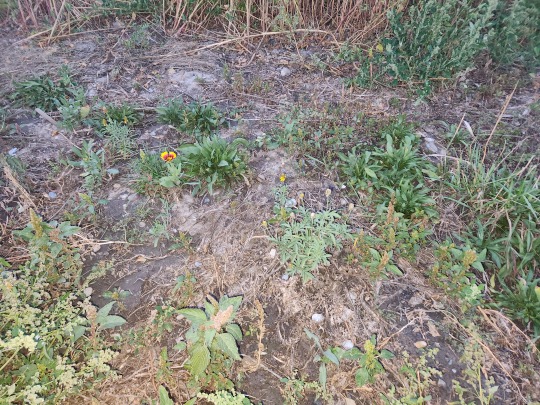
An experiment in an old abandoned plot near the CBC building was undertook (undertaken?) to restore a site entirely devoid of native forbs to one that IS entirely native forbs in 2024. This project will be continuing into 2025. Near the parking lot on the North end of the lot, facing 16th avenue, a large quantity of soil was piled up and flatted somewhat, and this soil has been colonized by lamb's quarters, red root amaranth, and to a lesser extent- prostrate knotweed, and tumbleweed mustard.
The extreme ecological poverty of the site made me eager to intervene, as it could only improve from here.
The first step was sowing. Around February 2024, I brought seeds of the showy milkweed, northern bedstraw, blanketflower, wild blue flax, coneflower, purple asters, white aster, alpine pussytoes, and a heap of curlycup gumweed. I marked these with popsicle sticks.
The second step was supposed to be reaping. In April or May, a quantity of amaranth sprouts that had to be seen to be believed erupted on the site. Within 2 weeks, the lamb's quarters had reached nearly 20 cm in height. I started frantically weeding to see if ANYTHING had sprouted. I finally found something that looked to be in Asteraceae- to confirm my suspicions, I used "Picture This," and the tiny rosette was identified to be Grindelia squarrosa- the curly cupped gumweed.

As a tiny seedling distantly related to dandelion and thistle, it really doesn't look like much. It won't even bloom in its first year.
I remembered reading that curlycup gumweed is a species that dominates dryer rangeland when the site is overgrazed. It was then that I realized I could be the grazer. I manically pulled thousands of lamb's quarters and realized that there were several dozen gumweed seedlings eking out a living beneath the oppressive canopy of one of the fastest growing weeds in the county.
By September, many more plants started to show themselves. Below, you'll see these hairy lobed leaves - these are blanketflower - the deeply lobed leaves in the top right are prairie coneflower. The blue-green whorled stems are wild blue flax. The large rosettes are of the curly cupped gumweed. Many of these plants have not flowered on their first year, but establishment of seedlings has been decent, and it bodes well for next year.
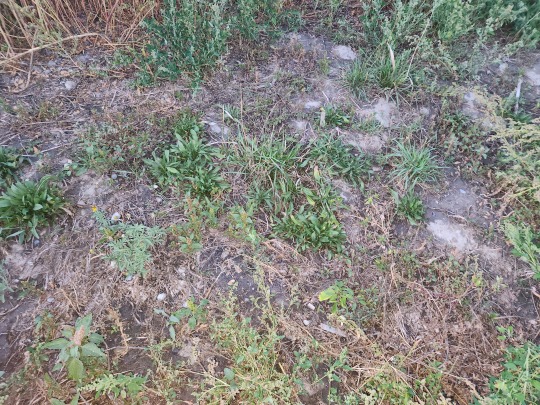
The site doesn't look like much without knowing what these plants are. It DOES look like much up close.
Below- blanketflower (hairy lobed leaves) gumweed (spatulate leaves, center) flax (blue-green, whorled stems) and coneflower (top left). I think the pointed toothed leaves on the plant in the top center might be a goldenrod (Solidago) but I'm not sure.
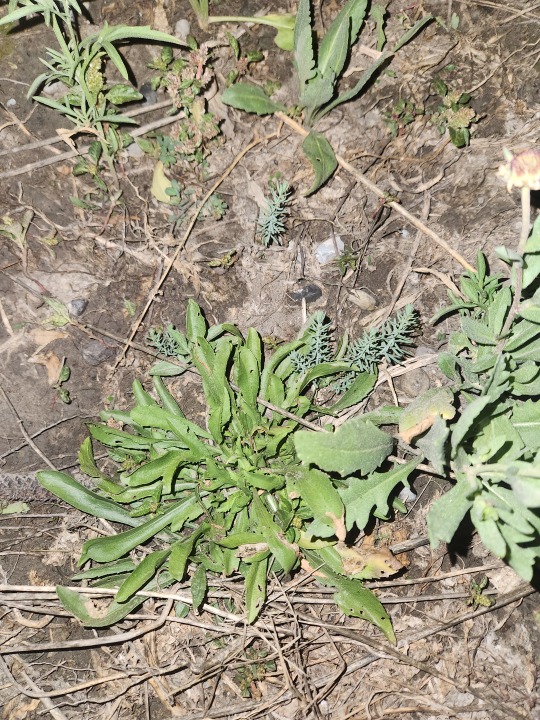
Below: A single hairy false golden aster (Heterotheca villosa) was in bloom. I would count that as a success.
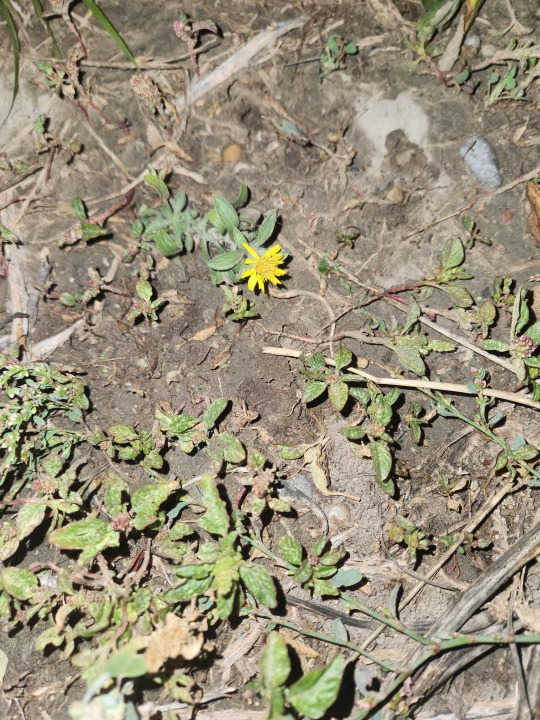
I noticed that with the exception of this single golden aster, the species that are established are almost entirely those without tufted achenes (such as the Solidago and the Symphyotrichum species) because the seeds didn't blow away. This winter I seeded a lot more, this time including broom snakeweed. I tried to get fluffier seeds embedded in either mud or snow, but I'm sure a lot of these seeds will blow away or be eaten by mice.
I barely watered this plot and all that I really did was seed and weed. I hope some of these plants will get a foothold and persist in the relatively unmanaged area along the walking path north of Parkdale.
85 notes
·
View notes
Note
Deeply in awe of your knights. The characterisation, the designs, the ✨️vibes✨️ are simply... *chef's kiss*
Would you be willing to share more lore about them? Would love to know more about their curse and, of course, how Reginald managed to waltz right into their woods. Unless it's spoilers for a bigger project, ofc.
I wish this would become something more in the future, but for now it's just a piece of lore I have in my head.
There will be a lot of text now.
Let's start with the fact that according to the lore, long before the start of the main events, a war occurred between humans and non-humans (mostly elves).

who doesn't know what we're talking about, we're talking about them
After the defeat of the non-humans, the remnants of the once great civilization decided to leave their lands for safety. Then Gadriel started a small rebellion among his ranks, refusing to leave their home. As a result, Thanoth and Raglan supported him, and the three emerged victorious in the skirmish, tearing apart their brothers and sisters. The culmination was that his lover also fell at his hands. He did not mean to kill her, but he miscalculated his powers and gnaw her to death. (For context, Gadriel and the rest of his people, including Raglan and Thanoth, are werewolves or lycanthropes, so yes, he literally gnaw her to death.) But before she died, she cursed the trio.
What is the essence of the curse?
- The traitors were burned alive in their own armor and now they can't take it off completely, because now it's their second skin, the ashes from the once white armor can no longer be washed off, and in place of blood there is red-hot gold. Gadriel, of course, tried to take off his helmet, but as a result, half of his face remained embedded in the metal inside the visor.
- They are tied to the fortress territory, and now nothing grows in its vicinity, the water is poisoned, and the only living creatures are ghouls, corpse eaters and fortress guards (gargoyles, automatons and other magical creatures created to guard castles, fortresses and ect)
- Immortality. A typical curse of immortality, when the cursed one does not feel taste and no matter what he eats, nothing will satisfy his hunger.
- And eternal, never-ending pain from burns and hot metal in the veins.
- On top of that, the curse burned out their eyes and they are blind, so they are guided mostly by sound and smell. Later, Reginald returned one of Gadriel's eyes, of course, half-blind, but it's working!


How did Reginald meet them?
Shortly before the end of the war, people created an order dedicated to the destruction of non-humans, sorcerers, and others. In simple terms, the Inquisition. Reginald was part of this order (he didn't really have a choice, he got there as a child). At some point, it dawned on him that his brotherhood was doing terrible things, and he suddenly discovered magical abilities in himself, and he escaped. True, not the first time, but he still managed to feel the hot silver on himself.
Thus, the order drove him to the cursed lands, because there was nowhere else to hide, and the Inquisition didn't stick its nose in there.
In fact, that is how Reginald met them. You could say he was lucky in a way. His blood relationship with Galadriel's beloved saved him from death. There are two reasons for this:
- Gadriel feels guilty and regrets her death.
- And since Reginald is her descendant, he should be able to lift the curse from them.
Except that there is a nuance, he is a very inexperienced sorcerer and on top of everything else, the Inquisition burned his palms with silver (this is important) and he cannot cast spells normally, because the magic cannot come out, therefore this causes Reginald burning pain.
63 notes
·
View notes
Note
do you have thoughts about the way MHA431 went?
Sure, I'll bite. Let's have a
Chapter Thoughts - Chapter 431: More
Some of this will be a rephrase/expansion on stuff I said in Part 3 of the fascism essay, particularly the section about how Heroes view the prospect of long-term peace, but it’s all worth saying here as well.
Hit the jump for some roughly ordered thoughts primarily about Ochaco’s counseling program, the romance stuff and how it’s facilitated, some stray character observations, and some Stillness-typical complaining about the handling of Villains.
O It was nice to see Ochaco’s program in more detail than the jaw-droppingly bad handwave it got in 430, but I still think it didn’t go anywhere near far enough. To wit, what we see is a nice introduction to a program that could well be effective at finding some people with behavioral, familial, or quirk-based problems, but the depiction is badly lacking an illustration as to what will be done regarding people with problems that can’t be helped by a tiny bit of encouragement and support. As it’s with Toga in mind that Ochaco undertook this whole project, it seems fair to ask: How would Toga have fared in it?
If it had been young Toga Himiko in the scene instead of Shy Mining Helmet Boy, Ochaco offering her a little anti-gravity boost would have gone exactly nowhere because no amount of manuevering would have changed Himiko’s basic inability to participate in the activity. It would have clued Ochaco into Himiko having an issue, though, and perhaps that discovery could have led, with further interaction, to uncovering her feelings of repression and, critically, her problems at home. Great! That stuff absolutely needed to be uncovered!
But—then what? When Ochaco’s program turns up Himiko, a girl with a problem so severe that no amount of welcoming class play is going to resolve it, what’s the next step? Recommend counseling for her parents, too? What if they’re resistant, resentful, or they outright refuse? Do you then remove Himiko from the home? Let’s switch the lens over to a different kid for a second: Shimura Kotarou. As evinced by his massive unaddressed abandonment issues, the alternative child care system clearly did him no favors! And he didn’t have a taboo quirk[1] to add on top of the perception of his being an “unwanted child”!
So if you haven’t improved the state of Japan’s alternative child care system—and there’s no specific evidence that anyone has[2]—have you done much but kicked the consequences down the road a few years or slightly changed the color of the problem at hand? Would Himiko really fare so much better in a group home or orphanage? Would the views of the people in charge be significantly different than those of Himiko’s previous counselor? Or would they just be, as Tomura described his family doing to him, rejecting her kindly instead of cruelly?
1: And “taboo” is honestly putting it lightly. Shinto beliefs about the spiritual pollution of spilled blood being what they are, Toga’s quirk would actually be profane to a devout adherent—if the reader is familiar with X-Men, think about the kind of nastiness that periodically gets thrown at Nightcrawler by particularly militant Christians. There’s no indication that Toga’s parents are more devout than the average Japanese person, of course, but values embedded in the culture are going to be embedded in the culture all the same.
2: All we have in that direction is Uraraka enthusing that the program has a lot of support and does very thorough work, and noting that Hawks does negotiations with the Ministry of Education and other (non-specific) organizations, which we see him framing as “investing in young people.” While this could be indicative of efforts being made somewhere, by someone, to improve the situation for children in alternative care, that read is undercut by Uraraka following up with the note that all this work has done a lot to improve “the quirk education environment.” This falls far short of specific evidence for improvements to any given other aspect of child welfare.
While I’m sure we’re intended to read Ochaco’s program as one that will be meaningfully helpful to children like Toga—and I don’t even think that it categorically couldn’t be!—what we see directly on the page simply does not prove that case. Encouraging a baseline kid with an emitter quirk and age-typical shyness does not prove that The Problem of Toga has been addressed. So what was even the point of showing it to us?
What Himiko really needs—if you’ll pardon my MLA Stan coming out here for a bit—is a complete reevaluation of what quirks are and how people can use them. She needs a world that’s willing to throw out its old ways of thinking, to update its “notion of normal” to something that will allow the Toga Himikos of the world to live without suppression. For all the good I'm sure it will do, I don’t see Ochaco’s program doing that.
O It’s so hilariously telling that we got that whole shpiel about updating the Billboard Charts such that non-professional Heroes can be recognized for their efforts, only for the last chapter to give us jack shit on any non-Pro Heroes charting at all. And like, I’m willing to be generous here: I always assumed that Hawks wasn’t talking about adding non-Pros to the charts verbatim, but rather creating a brand-new chart for the recognition of Civilian Heroes. But we don’t get anything like that at all—and Deku being a teacher and public speaker gives us a perfect opportunity to indicate such a chart’s existence! But then, maybe he can’t count because he does Hero work on the weekends, which leads me to my next point.
O Ochaco and Deku should both have just retired, and Shouto should be on sabbatical. Seriously, if Horikoshi really had the courage of the convictions he was putting to paper, and if it were really true that the Villain emergence rate was down and Heroes were beginning to have more free time, then Ochaco and Deku should both have decided to prioritize the work they believe is more meaningful and helpful than Professional Heroics, and Shouto should feel free to take some time completely off for his self-exploration. That none of this happens suggests that Horikoshi either didn’t believe or didn’t trust his audience to accept his idea that there are meaningful ways for these characters to be heroic without them also having to be Heroes.
O Ochaco musing about Toga still existing somewhere inside her, and especially all the junk about the dead bisexual teenager being used to encourage the exhaustingly hetero endgame, really just makes me want to read the actual ghost story where Toga is literally haunting Ochaco. Toga still loves Ochaco-chan, of course, but her encouragement for Ochaco-chan and Deku to hook up is aimed solely at getting the two of them alone in a quiet, private room. Once that happens, Ochaco’s eyes will go gold and slitted, the walls will start dripping blood, and Deku will find out quite quickly that not everyone is so willing to move on from him murdering Shigaraki Tomura of the League of Villains.
O I miss the Bakugou who was on-course for a big personal growth arc about learning to work in a team. I feel like that Bakugou, alongside having had a way less tiresome endgame battle, might actually have been able to keep some sidekicks without being chiefly concerned about the level of their personal ambitions. I don’t give a shit about his (or anyone else save one guy’s) chart position, but it’s exhausting that he had great development into being a proud but capable team player all the way up through the 1-A versus Deku fight, and then all of that gets flushed down the toilet to revert to him getting a badass solo fight against All For One and an epilogue that allows him no work partner options whatsoever outside of the main character.
O The comedy visuals of Deku’s dumb face being subsumed by Bakugou’s plush backseat make me want to die. Someone please throw this main character away.
O I’m glad Mina reclaimed at least some aspect of her original Alien Queen aspirations with the “Ridley Hero” thing. Good for her.
O On a worldbuilding note, my attention is caught by Shinsou being described as “not contending” for a chart position, though the kanji can also mean things like “out of contention” or “beyond the sphere of.” I assume it’s just indicating that Shinsou is an underground Hero like his mentor Aizawa, but a) I feel like that runs a bit counter to his goal of proving that he can be a Hero even with a quirk like Brainwash, and b) isn’t it a bit sketchy if underground Heroes can just choose to exempt themselves from the most visible, public-facing form of Pro Hero evaluation? Maybe the HPSC charts them for its own records and then removes them from public visibility, of course, or maybe the charts only go down to 200 or so and stop after that, with Shinsou, not seeking for attention, comfortable to be below that cut-off. Not sure, but there are some interesting possibilities there, as well as some concerning ones.
O HOLY GOD, Monoma’s new look. I like it very much. He is also the only person I want to see on the charts at all. Two hundred ranked entries of Monoma's daily work antics. I support him wholly and with only the most loving of faceitiousness.
O Extremely funny to me that all the people I saw on Twitter talking about this chapter confirming KamiJirou had to first ignore Jirou explicitly denying that there’s anything going on and second be very disingenuous indeed with the panel crop they used to wave around crowing about their ship. I don’t have a strong distaste for KamiJirou relative to my distaste for Kaminari himself, but my tolerance for him pretty much starts and ends with KamiJirouMomo as a poly arrangement, so I was pleased to see that left open here.
O If I dislike Toga’s image being used to encourage Ochaco to hook up with Deku (and I dislike it very much, particularly given the loathsome last words Deku spoke to Toga when she was alive, but at least I can see the sense it makes from a thematic and characterization perspective), I have only profanity for how much I hate Shigaraki’s image being used to encourage Deku in confessing to Ochaco. Just take my entire folder full of negative reaction memes. Jesus Christ.
I have said before, and will have more to say in the future, about Deku’s assorted failures as a protagonist and hero, but him deciding that the kind of adult he wants to be is a Hero high school teacher really is the ultimate indicator of just how little he cared about who Shigaraki was and what he wanted. Ochaco is making a good faith effort to help the Toga Himikos of the future. Deku, meanwhile, is shallowly paddling around in his Hero Worship wading pool, ignoring both the Shimura Tenkos and the Shigaraki Tomuras of the world—the people Hero Society outcasts, villainizes, and sweeps under the rug.
Shigaraki’s last behest—that Deku ensure the things Shigaraki fought to destroy remain destroyed—was wasted on Deku, who, once he got Spinner and Overhaul off his conscience, clearly could not give less of a shit about helping the people Shigaraki fought for. To see that last behest come back in the context of Deku using it to bolster his goddamn love life is a fucking travesty, and I hope Ochaco dumps him inside of a year if Toga Himiko’s vengeful ghost doesn’t get him first.
O DON’T WORRY, GUYS; I’M SURE THE HEROES TOTALLY TRY TO BE MORE COMPASSIONATE AND UNDERSTANDING TOWARDS RANDOM, DOWN-ON-THEIR-LUCK VILLAINS NOW. THINGS ARE SURE TO BE TOTALLY DIFFER—

Oh. Oh, it’s not different at all, is it?
(Have I mentioned enough times yet how much I really, really dislike the street crime scenes where Our Heroes stand around and chitchat in the middle of a crime scene, having successfully dealt with the big bad villain whose actions they did not even attempt to de-escalate and whom they have immediately forgotten all about?)
O Wow, thanks for letting us know you don’t think impulse criminals aren’t wicked to the core, Iida. That makes me feel real reassured about how you guys are handling Villains who premeditate! (It does not.)
O I’ve already said I disliked how Toga’s “image” is used here, but let me not shortchange the fact that it also sucks because it puts the last nail in the coffin of Uraraka having any agency over sharing her own feelings. She has a lengthy arc about how she is—like Toga in the past—repressing her feelings for the one she loves; she gets through to Toga by frankly admitting to those feelings, as well as all the other things she was sitting on about Toga herself. And then in the aftermath, she goes right back to repressing her feelings, now ones of paralyzing grief over Toga’s death. Deku witnesses those feelings not because she chooses to share them with him, but because he tracks her down mid-cry. And now we find out for sure what Chapter 430 left unclear: that in eight years, Ochaco hasn’t said a word about her once-again repressed feelings for him. Instead, just as she did when she was a teenager, she’s doubled down on putting those feelings away in the name of what she “should” be doing.
And here? Does she finally take control of her own life, her own feelings, her own expression? No. At least, not until after Deku has been the one to confess first and Vision!Toga psychically shoves her forward to close the gap. The only thing left for Ochaco to do, the only assertiveness asked of her, is to accept or rebuff Deku’s overture. Good god, you’d think she was Eri, a helpless waif wrestling with indoctrination about how much she’s not allowed to want anything for her own sake, whose turning point in the narrative is finding the strength to reach back for the hand being extended towards her.
Coming from a long-term abuse victim, that’s a perfectly worthy character arc, even a deeply moving show of strength, but it’s wildly pathetic for BNHA’s most prominent female hero, the gal whose character arc was founded entirely on balancing her desire to help others with pursuing her own happiness. Good lord, did Shonen Jump tell Horikoshi that boys don’t like it when girls are too forward or what?
#bnha#bnha 431#chapter thoughts#uraraka ochaco#no. 2 green#toga himiko#class talk#bnha epilogue#bnha critical#quirk counseling#bnha hero society#stillness answers#stillness has salt
64 notes
·
View notes
Text
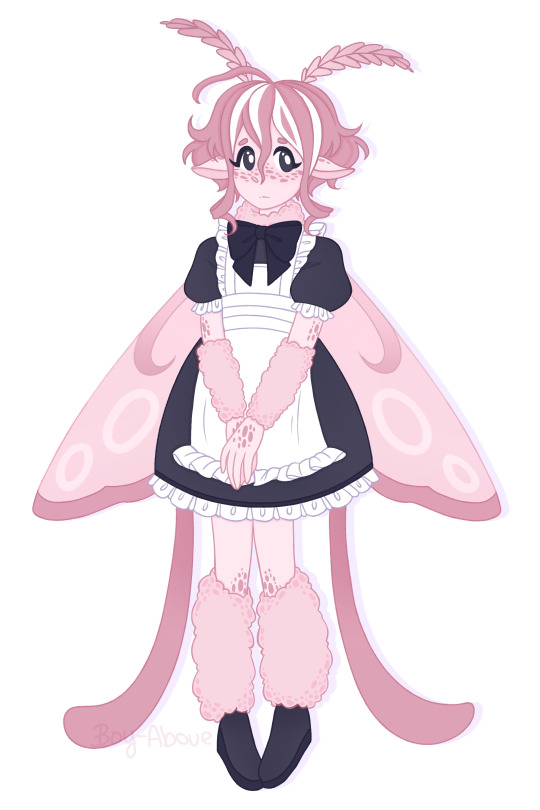
minette but in ✨disguise✨
i'm unsure if i've talked about the updated story of my royal ocs so i don't know if you guys have context for mothnette, so i shall update you here!
solstrians who attempt to flee their kingdom are usually hunted down and their wings are forcibly cut off, so it's incredibly rare to see a winged solstrian outside of solstria. knowing this, it was imperative minette disguise herself as a different creature lest she be hunted and lose her wings. so for all of her travels, she posed as a moth person. once she made it to rexcanima she continued to use this disguise and worked as a maid inside the castle. she would always attempt to get close to mikhail as the heat he radiates soothed her chronic pain, but a lot of times she ended up embarrassing herself and would cry in private because she was making a fool out of herself in front of the king. her chronic pain and fatique made it difficult for her to properly do her job as well, and she frequently had to take breaks or would collapse, accidentally breaking things often.
her real identity was finally discovered by the castle staff one day when she collapsed, and while inspecting her injuries, the head maid discovered the crystal embedded in her arm that allows her to project her disguise. the head maid had no choice but to alert the guards and king, as someone disguised and seemingly always wanting to be close to the king could very easily be a spy or assassin. mikhail took her to anatoly the doctor to inspect her crystal, as she had worn it for way longer than she was supposed to and her skin began growing over it.
anatoly surgically removed her crystal, while minette begged and begged for him not to. as previously stated he felt like he had to because her behavior was very suspicious. once her disguise was finally removed, anatoly felt immediate sympathy and understanding for her. while he couldn't have known she was a princess, he understood immediately why a winged solstrian would be hiding her true identity. anatoly himself is a solstrian who had his wings taken thousands of years ago. on top of that he could tell why minette left her kingdom in the first place, as its clear from the size of her wings that she is flightless. being flightless is essentially a disability in solstrian society, the flightless are seen as lesser individuals and the kingdom itself is incredibly inaccessible if you can't fly.
after a full blown panic attack, minette was eventually able to tell them her full story. how she was the former heir to the throne, how her connection to the sun was severed, how her parents attempted to kill her. anatoly was blown away upon learning she was without the sun, as solstrians unbonded to the sun only live for up to a few hours afterward. minette was a medical anamoly and anatoly didn't think such a thing was possible. he was immediately drowned in empathy and compassion for her as he knew that the pain must be unbearable, and upon hearing that mikhail's heat soothed her pain he was completely fascinating. mikhail and anatoly had always wondered where mikhail's flame pelt came from, and it was kind of like discovering an unknown truth, he must have been blessed by the sun.
mikhail was full of regret for how he'd treated minette before he discovered all this, he'd found her kind of awkward and assumed she wanted to be close to him so badly was simply because he was the king and she was an ass-kisser. when he found out his presence lessened her pain he was instantly protective of her. internally he was like "i should Die, i thought she was annoying but she just wanted the pain to go away, i'm a horrible person." it didn't help that he was instantly captivated by her beauty once he saw her undisguised, he treated her poorly AND she was hot!!
after that the story is pretty much the same, minette and mikhail get progressively closer and fall in love. they are my pookies.
#royal ocs#martshals#my ocs#original character#if you read this... i love you forever#thank you to anyone who keeps up with my ocs 🥺
28 notes
·
View notes
Text
Neither Denji, Yoshida nor their author can achieve normalcy
Let's look at Chainsaw Man as a narrative whole. There's no point in an author dealing with a subject that's already been dealt with, except to say something additional: so what does this chapter tell us?
Entitled "Normal Life", the chapter refers directly to Denji's previous dream: a normal life became Yoshida's offer to push him to stop being Chainsaw Man.
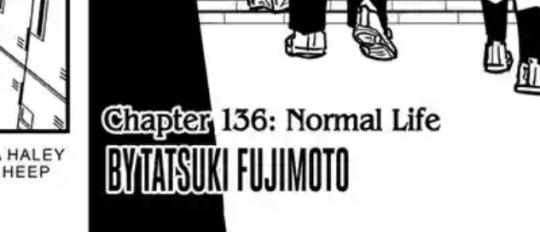
Fujimoto knows that you've understood that Denji intends to go beyond normality. This is something we learned from the whole of Part 1: normality had already been used by Makima to manipulate Denji. Here, things seem redundant, as Yoshida follows in the footsteps of the former antagonist. On top of that, while Denji was communicating and showing a certain emotional vulnerability, he's being sexually assaulted?

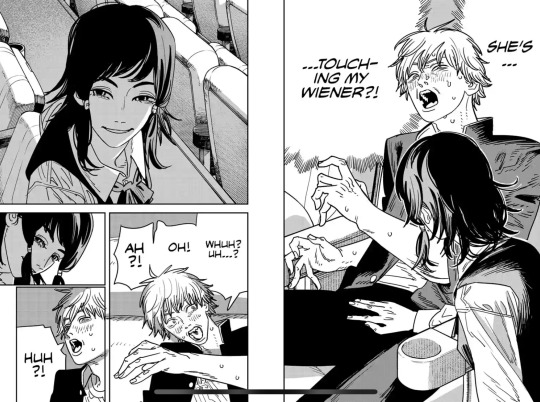
Why this chapter? Why tell it like it is? Fujimoto doesn't seem to initiate anything new, worse, erases his own developments.
The answer is easy, and Fujimoto gives it to us: this chapter is frustrating because it consciously shows you that he's incapable of writing and describing a normal life.
The first few pages serve to show that Denji is incapable of living anonymously and incognito when his environment permanently gravitates around the figure of Chainsaw Man. Denji literally finds himself in a fight to his detriment, and is punched in the face in the name of his heroic identity. Back in the face.

The second page serves to show that Denji can't achieve this so-called normativity by his past, by who he is, but above all by the way he's perceived by society and his guardians. He doesn't have a normal past, so how can he achieve a normal present? The others don't see him as lambda, so how can he become one?
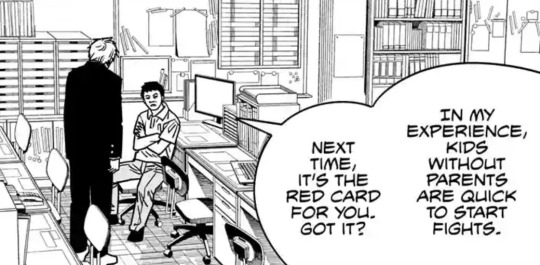
The third thing that will prevent Denji from achieving this normal life is the man who intends to offer it to him: Yoshida. In his equally unconventional present as a demon hunter. He tells him explicitly: he has no idea what a normal high-school student does. Normal he isn't, since a normal high-school student is a professional cover for him.
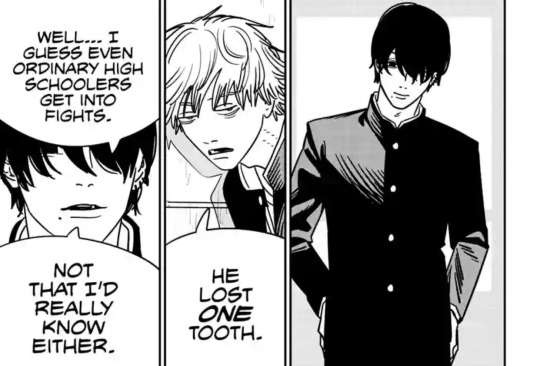
Denji and Yoshida perceive a normal schoolgirl, that is, the ordinary life of a schoolboy, as something projected and unattainable. Just like the love of a hug is unattainable for Denji and Makima. Yoshida and Denji are distanced from it by this abnormality embedded in their daily lives: a demon.
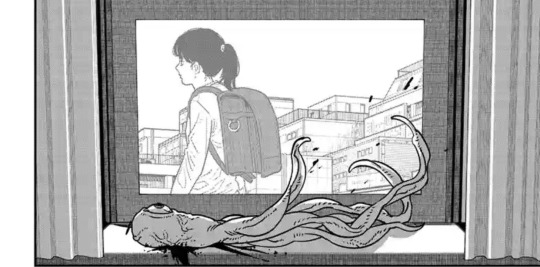
Yoshida's assertion that the world won't end without Chainsaw Man also loses its meaning. Granted, Chainsaw Man isn't the only one to eradicate demons. But who will save the world?
How can a boy whose family includes a demonic little sister, and a demonic dog who is both his heart and his family, find his way in this normal life other than by being isolated?

In this empty room, doesn't it seem more like Chainsaw Man is deliberately isolated? Trapped in this normal life he can't quite fit into. Whether it's because of his identity as Chainsaw Man, as Denji, whether it's because Yoshida offers him this girl who looks like a demon who literally followed orders to sleep with him, this sex-obsessed boy?


Why abruptly cut off Denji's realization that he's in a bad way? With this demon-like girl sexually assaulting him? Why does this ending seem so abrupt?

Because what Fujimoto is indicating is that he's not capable of writing a normal life for Denji either, that his writing will never be gentle, that his character will never be able to give himself up in appropriate, normal circumstances: that a trauma will always resurface.
Whether it's the demon that prevents him from accessing the life projected before him, or the demon that brutally cuts him off from his confessions by attacking him. Fujimoto confronts his own hero, who no longer knows what to do?
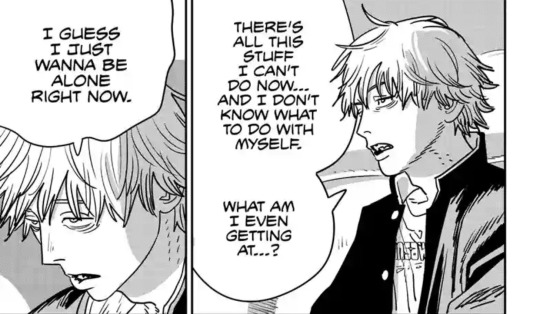
Make love? In a world populated by demons? In a world crawling with Chainsaw Man? With an author unable to depict a normal life without brutally interrupting it, frustrating his own reader?
The normal life we'd all like Denji to have: neither he, nor the man who offers it, nor the man who writes it, will give it to us.
616 notes
·
View notes